#(i Should work on perspective but i . Cannot . i will probably become evil)
Text
silly funy wip
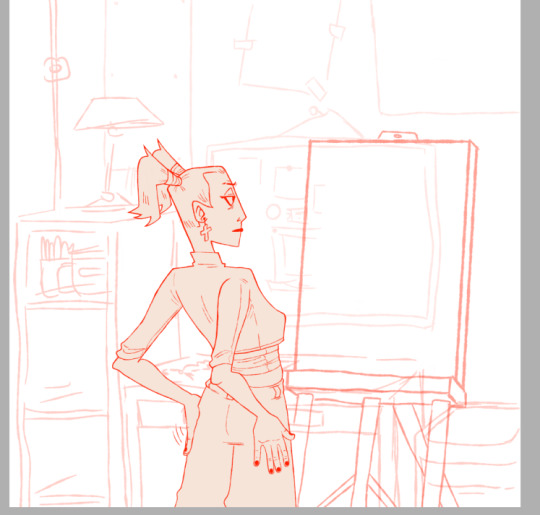

#i havent reread i feel sick in a While i am too scared too... like i KNOW it probably didnt age super well but still..........#i have the comics like . in my shelf atm i can Read them but erm.............i wuold much rather be nostalgic#and draw Angsty Woman Of Oldge Comics Yore#gonna redo the furniture in the bg... i like th squiggly lines but i want them to be smaller -_-#frank art#this is still VERY unfinished i wanna say like 40% done bc iim wanting to practice more hogwild lighting moments#i feel like my arts been stagnant so im just drawing Different stuff and focusing on backgrounds or lighting or Something#(i Should work on perspective but i . Cannot . i will probably become evil)
25 notes
·
View notes
Text
True Balance in the Force
I think an issue with Star Wars and its interpretation is that George Lucas takes a superficial understanding of Eastern philosophy and tries to apply to it a more Christian view of good and evil that just does not work well. Good and evil as warring concepts do not exist in the same fashion in Eastern philosophies. It’s like trying to fit a square peg into a round hole.
What do I mean?
Well, the Jedi say that the Dark Side is evil, and the Light Side is good. However, this conflict does not work with Taoism, for example, which probably makes for the best analogy for the dual nature of the Force. Taoism would say that things are defined by their opposites. Moreover, they cannot exist without their opposites. Yin and Yang are not seen as opposing forces per se. They are interdependent and complementary. Neither one is better or more moral than the other. Taoism also preaches "balance." This means having a healthy balance between these two extremes, not that one is the corruption of the other.
The parallels between this perspective and the Jedi and Sith are clear. There is the Dark Side which is anger, hate, fear, conflict, passions etc. Then there is the opposing Light Side which is peace, harmony, tranquility etc. However, the error is in the statement that says the Light Side is better than the Dark Side. This is where I feel there is an attempt to apply a superficial view of good v evil on a philosophy where that just does not work. This is not about God v. Satan; this is just about emotions which are amoral.
At first blush, it may make sense to say that the Dark Side, which is based on anger, is evil. However, when you scratch away at it, I argue that does not make sense. For instance, I hate child abuse. That is hatred and I would argue it is a good hatred. I will also oppose child abuse because of this hatred of the harming of children. This is not evil just because it is "dark." Likewise, Luke is not in danger of becoming evil just because he feels anger and hatred when Palpatine is killing his friends and allies in front of him. He might be in danger of darkness, yes, but not evil. There is a difference. It is not evil to hate evil. It is not evil to act out of that hatred too. It should motivate you to oppose evil in every way you can.
Moreover, harmony, peace, and tranquility may seem like good things at first, but that may not always be the case. Conflict is necessary where you see a wrong that must be righted. The Jedi were so harmonious, they refused to rock the boat where it was necessary. They let bad things happen and went along with things for the sake of maintaining the status quo. Sometimes you need a bit of aggression. It’s not always bad. Being too passive and conflict-avoidant is not always good.
In this way, the Dark and Light feed off of each other. If you love something, you will hate what hurts it. Anakin aptly points out that love is necessary for compassion. However, the Jedi are wary of it, because it is a strong emotion that can lead to darker ones. This does not make it evil. It shows how entwined Dark and Light can be. (Honestly, vaaapad is treading pretty closely to this idea. Maybe that’s why Mace lasted more than any other against Palpatine.)
At the end of the day, only cleaving to the Dark Side is bad. Always being angry, and hateful, and upset, and in conflict over everything is not healthy at all. This cannot always be your approach to life. And, in the worst cases, you even get the Sith, especially since the Force can act as an echo chamber and can start using you as much as you use it. Conversely, always being passive, tranquil, and “peaceful” can be damaging too, in the same way that it is possible to have toxic positivity. The Jedi are guilty of trying only to cleave to the Light Side. That is not healthy either.
George Lucas has indicated that bringing balance to the Force meant that Anakin would destroy the Sith. That the Dark Side is a corruption. Certainly that is what the Jedi think. Maybe it is what Lucas thinks, but morally it makes little sense to me. Personally, I am of the opinion that balance to the Force ought to mean that people would learn to not use the Light or the Dark Side exclusively and excessively.
Anakin wipes out the Jedi. He wipes out the Sith. He lives as a part of both Orders, and then finds balance. True balance.
One thing I liked about the Mortis arc in Tcw is that Anakin was confirmed as the chosen one because he could hold/control both the Daughter, the Light, and the Son, the Dark. The father himself represented that balance. It was not one or the other.
This belief is supported by Legends sources. In those, the precursor of the Jedi Order was the Je'Daii. They believed you had to use both "Bogan" and "Ashla" or the Dark and Light sides of the Force equally. Being out of balance with either was dangerous. Eventually, there was a civil war. Some people said Bogan was better and some said Ashla was. Then, you get to the prequel Jedi who are Light Side only users, and this is actually not good at all.
Forcefuls should feel all their emotions and act out of them whether it be dark or light. There is not a single thing wrong with hating slavery and fighting against slavers, even if that is dark. There is nothing wrong with loving people and healing them, even if that is light. Just make certain there is balance and control.
If you are to judge what makes things good or evil, it ought to be in what the act entails, not the emotion that fuels them. People need to find the balance inside of themselves. Iirc, this is also a conclusion Luke comes to in Legends.
#meta#balance to the force#dark side#light side#we see many force traditions apart from Jedi and sith too
46 notes
·
View notes
Text
finished leopardstars honor! final notes from the last 100 pages:
-the editing got really bad towards the end. i genuinely dont think anyone proofread a good chunk of the last couple of chapters. there were so many continuity errors that it almost makes me think they ran out of time to publish the book and just sent it though
-in a similar vein, the ending was also extremely rushed. the point of a leopardstar super edition to my understanding was to get a view on her perspective on tigerstar and tigerclan. so why was only ~80 pages of the book focused on that? the exposition in her early life was nice, but some of it definitely seemed like it was just kate cary wanting to write fanfiction about her fave. which is fine and all i guess, but why advertise it as a book about leopardstars leadership and her biggest mistake when its largely a book talking about her upbringing and her relationships with her clanmates? this also didnt make much sense to me considering the sheer number of books we have now that extensively describe the events of the first arc. it was obvious at multiple points in the book that the authors were limited by the fact that weve seen leopardstars words and actions from firestars point of view, so it was limited in what they could have her do or say regardless of the new character arc they'd given her earlier in the book. they could write her feelings, but it didnt really matter when what she said was still the same generic antagonistic character lines she had in the first arc. thats the problem with constantly rewriting the same events, you literally cannot change what happens, so it becomes extremely difficult to insert complexity where there wasn't any before.
-why introduce a plot line about a prophecy, imply over and over again its true, *end the book* pushing the idea that its true, and then...not really reinforce that through anything that happens? once again, this is the problem you have when you try to insert complexity into parts of the series that were not meant to be complex. leopardstar was an important character in the first arc, sure, but only because she was a participant in tigerstars evil plans. she did not ever actively try to "save the clans", and honestly, this book doesn't try to make you believe she did either. its still very obviously firestar who masterminds every act of rebellion against tigerstar, while she's kind of just. there watching. and going "oh no i wish this wasn't happening!" truly what was the point of a prophecy that wasn't true. imo a prophecy warning mudfur of some vague "important choice" she would have to make would have worked so much better with the narrative. particularly because she had *so many* arguably important choices that could have thrown her off throughout the book (i.e. frogleap, disobeying crookedstars orders, trying to keep windclan out, etc) until she finally reached the decision to join tigerclan, in which she clearly believed she was making the right decision until it was too late. the vague "you're destined to save us!" prophecy was lame when she was still a background character in the events happening!!
-this book seriously could have and probably should have just been a novella. only the last 80 or so pages were important and they were horribly written due to using the first 430 pages to write fluff and exposition about borders and sunningrocks and whatnot. the only truly interesting parts of the book, besides tigerclan, were leopardstars personal relationships with her clanmates. reading over and over again about sunningrocks is draining. please stop erin hunter im begging you. there should have been at least another 100 pages dedicated to putting more detail into her participation in tigerclan. there were way too many time skips at the end, and many of them went completely unmentioned until it was implied that a few days or even months had passed, and you just had to rewire your view of the rest of what you'd just read to put it into different context. if you're getting to a point where you have to skip major plot points because you don't have enough room to include them, you need to go back and evaluate what you spent your time on in the earlier parts of the book.
#i think thats it for now#overall mid book#i dont regret reading it but it definitely added absolutely nothing to the series as a whole#maybe besides making whiteclaw a real character and adding actual weight behind his death#simon says
0 notes
Text
The Role of Cognitive Distortion
From Captive Hearts: Captive Minds
Madeleine Tobias and Janja Lalich, Hunter House, 1994; 101-103
Proponents of cognitive therapy, based on the work of Aaron Beck and others, believe that by changing the way we think we can have a profound effect on the way we feel.(6) In Feeling Good: The New Mood Therapy, David Burns outlines 10 common mistakes in thinking, which he calls cognitive distortions.(7) These distortions are explained here in the context of post cult recovery.
1. All-or-nothing thinking: Cults teach black-and-white thinking, such as “Everyone outside the group is controlled by Satan or is evil,” “The leader is God and cannot make mistakes,” “You must always strive for perfection in order to reach the group’s goal.” Such thinking stifles personal growth and keeps a person pitted against the rest of the world.
2. Overgeneralization: Simply making one mistake can cause a person to leap to the conclusion that the group’s predictions about dire consequences for those who leave are indeed coming true. Former members often have difficulty allowing themselves to make mistakes without hearing criticisms in their head. Reviewing actions at the end of the day, no matter how simple, can help counterbalance the internal cult “chatter.”
3. Mental filter: cults teach people to dwell on their mistakes and weaknesses. In many cults each day’s activities are reviewed, with concentration placed on any “sins” or wrongdoing. All thoughts, feelings, and behaviors are cause for criticism, prayer, and repenting. After such training, a person may obsess about a small mistake and lose sight of the positive things that are happening. Anything negative becomes a focus that filters out everything else.
4. Disqualifying the positive: One means of cult control is to not allow members to take pride in their achievements. All that is good comes from the Master, while members are made to feel stupid and inadequate. Making lists of personal strengths and accomplishments may counteract this reaction.
5. Jumping to conclusions: There are two forms of coming to a negative conclusion, which are probably familiar to ex-members:
(a) Mind reading: Those who were in New Age or Eastern cults may have been led to believe that mind reading is real. This belief is used to make assumptions about others. Doing the same now may be counterproductive. Don’t jump to conclusions about another person’s actions or attitudes. Don’t substitute assumptions for real communication.
(b) Fortune telling: Cults predict the failure of their critics, dissenters, and those who leave. Former members sometimes believe that depression, worry, or illness is sure to hound them (and their family) forever. Remember, such phobias and distortions have nothing to do with reality but have been instilled by the cult.
6. Magnification (catastrophizing) and minimization: Magnifying the members’ faults and weaknesses while minimizing strengths, assets, and talents is common. The opposite holds true for the leader. This trend has to be reversed in order to rebuild self-esteem, although reaching a balanced perspective may take time. Feedback from trustworthy, nonjudgmental friends may be helpful here.
7. Emotional reasoning: In groups that place emphasis on feeling over thinking, members learn to make choices and judge reality solely based on what they feel. This is true of all New Age groups and many transformational and psychology cults. Interpreting reality through feelings is a form of wishful thinking. If it really worked, we would all be wealthy and the world would be a safe and happy place. When this type of thinking turns negative, it can be a shortcut to depression and withdrawal: “I feel bad, worthless, and so on, therefore I am bad, worthless, and so on.”
8. “Should” statements: Cult beliefs and standards often continue to influence behavior in the form of shoulds, musts, have tos, and oughts. These words may be directed at others or at oneself-for example, thinking, “I should get out of bed.” The result is feeling pressured and resentful. Try to identify the source of these internal commands. Do they come from the former cult leader? Do you really want to obey him anymore?
9. Labeling and mislabeling: Ex-members put all kinds of negative labels on themselves for having been involved in a cult: stupid, jerk, sinner, crazy, bad, whore, no good, fool. Labeling oneself a failure for making a mistake (in this case, joining the cult) is mental horsewhipping. It is an overgeneralization, inaccurate, cruel, and, like the other cognitive distortions, untrue and self-defeating. Labeling others in this way is equally inaccurate and judgmental. If there must be labels, how about some positive ones?
10. Personalization: Burns calls this distortion “the mother of guilt.” A primary weapon of mind control is training members to believe that everything bad that happens is their fault. The guilt that accompanies this sort of personalizing is crippling and controlling. You are out of the cult now, so it is important only to take responsibility for what is yours.
These 10 cognitive errors are all habits of thinking that are deeply ingrained by the thought-reform processes and cult indoctrination. Tendencies toward these distortions may have been in place even before a person’s cult involvement, which may have enhanced vulnerability to recruitment and increased susceptibility to the cult’s practices. Given the habit of these kinds of destructive thinking patterns, is it any wonder that former cult members sometimes feel depressed? The good news is, like any habit, these patterns of thinking can be broken and discarded through awareness and practice.
Captive Hearts, Captive Minds: Freedom and Recovery from Cults and Abusive Relationships
0 notes
Note
"Tom Riddle effectively destroys the country from the inside out, which I believe was his true goal the entire time" (c) wait a second, so you think that he wasn't going to really take over or anything, just destroy the fuck out of w britain?
I have avoided this ask long enough.
I’ll start by saying that asking me about Tom Riddle is like staring down into a bottomless rabbit hole. We could travel down that path, but it is a dark and perilous journey, and by the end of it I will come out looking like the Mad Hatter.
It also requires a few prerequisites that you’re just going to accept as true (or else got off the crazy train here).
We know very little about Tom Riddle or Voldemort
What we do know of Tom Riddle comes to us from suspect sources
I’m just going to go out there and start with the basis that Tom is not crazy
Elaborating a little on number 1. We never actually see much of Tom Riddle or Voldemort directly. He’s a bit like Thanos in the MCU, or Palpatine in the first two movies of the Original Trilogy, he’s this looming threat that we pass by and glimpse every once in a while but never really get quality time with.
Generally, Voldemort makes an appearance in a moment of crisis.
He and Harry fight over the philosopher’s stone for Tom’s very survival. He and Harry fight over the diary for Tom’s very survival. He resurrects himself with Harry as a witness. We get those very strange dreams from Voldemort’s perspective (half of which we later learn are fabricated).
None of these really lend to our, or Harry’s for that matter, understanding of Tom Riddle. There’s too much going on, it usually happens far too fast, and there’s usually something Tom Riddle desperately wants or needs that eclipses all other concerns or else he has an audience.
This is part of the reason we get those Halfblood Prince pensieve lessons: Harry knows nothing of Tom Riddle and doesn’t understand him at all.
Which leads us, of course, to number 2, most of what we know about Tom Riddle comes from Dumbledore. I’ve talked about this before, so I won’t spend much time on it, but Dumbledore has a very clear agenda in relaying these memories to Harry. Dumbledore already has strong suspicions of what objects are horcruxes and where they’re located, he already has Snape as a very reliable agent to continue work when he’s gone, his job here is to convince Harry there is no path but suicide. And that involves portraying Tom Riddle as the most evil man who ever eviled, was born eviler than the antichrist, and will die eviler than the antichrist.
Now, does this make Tom necessarily good or bad? No.
However, it does mean when Dumbledore tells us things like, “See, Harry, an impoverished child was upset when I lit all his belongings on fire! What a monster!” (especially given that, in a similar situation, Harry thought it was hilarious when Hagrid gave Dudley a permanent physical deformity and Harry was told he was an angel child) we should take it with a very large grain of salt.
Right, so, with all that backdrop what I’m getting at is that a) we can’t take Dumbledore at his word b) even if we could he could be wrong c) Harry doesn’t have the introspection to be able to figure himself when a or b is happening. I won’t elaborate on this last much, suffice to say that Harry’s world is very black and white, divided into the camps of those who personally like him and those who don’t.
So, why do I think Tom’s goal was not to rule the wizarding world but instead to destroy it?
A few things.
First, there are so many easier ways he could have ended up ruling the wizarding world. More, even when he effectively does rule the wizarding world in book seven, he takes very strange actions so that he’s never directly in power.
Second, I never really bought Tom’s racism. It’s too convenient and too contradictory with his backstory.
The second first, because we’re going out of order today. I’ve gone over this before, but I don’t believe Tom had minions early and I think he was effectively treated as a muggleborn (see here and here) until he took on the Voldemort persona many decades later. I’m hard pressed to believe someone as intelligent, angry, and proud as Tom Riddle would willingly believe and accept he was inferior to the likes of Abraxas Malfoy. More, even if he wished he was a halfblood, I think the evidence of him being muggleborn would be stacked too high against him to deny even to himself (and when he finds out it’s not true, he has maybe a month or so before he realized that he’s the bastard son of a squib).
And it’s just so convenient. All the people with the power, with the money, who are itching for a cause against a threat that doesn’t really exist believe in blood purity. Ergo, Voldemort shows up suddenly espousing over the top blood purity rhetoric (rhetoric that directly clashes with his “there is only power” philosophy at that).
In other words, I think Tom Riddle gave himself a line that he knew would get him places very quickly.
And now for the first. For a guy who has had the entire country in the palm of his hands twice, one time taking it over in a bloodless coup, he’s really big on causing collateral damage and really small on actually doing the ruling thing.
The first wizarding war, Tom Riddle as Voldemort has the backing of the heirs of the most prestigious and wealthy noble houses save a select few. These are people with seats in the Wizengamot, which has a frightening control over the government itself (including the minister of magic). I imagine, in 1980 had Tom Riddle wanted to be elected as Minister of Magic, he would have been elected as Minister of Magic. If he wanted a friendly face in office then he probably could have made that happen to.
More than even this though, by this point, Tom had already won. By having control over the majority of the Wizengamot he owns the government. He’s done, it’s over, it’s finished, and many of the characters admit as much which is why Harry Potter was such a miracle. So why all the seemingly random, exceptionally pointless, terrorism?
One answer is that Voldemort is crazy bananas. And sure, I guess we can go with that, except for someone insane he’s oddly effective and very consistent.
I believe Tom was systematically destroying the very foundations of the country through its core aristocratic families. Within a few short years Tom decimates the Black family, it goes from having five heirs to none, and while some of this isn’t Tom’s fault he does take care of quite a few of them. He brands Lucius for life, while Lucius rises high in politics he never escapes the stigma of being a known Death Eater and in the end cannot escape the consequences for his actions. The Malfoy family is very nearly destroyed by the end of the series, had Draco died in the Fiendfyre. The LeStrange family, presumably decimated as well.
More, this is mostly me headcanoning, but I imagine Tom fuels an extremism that the Wizarding World had never contemplated. I imagine, previously, anti-muggleborn sentiment was probably fairly rampant among purebloods. Oh, some were very pro-muggleborn I’m sure, but I think most were fairly “eh” on the people and felt they were a drain on society (such as requiring constant funding for the obliviation department).
However, when Diagon Alley starts getting blown up every other week, when muggleborns start being tortured and murdered, when purebloods who aren’t anti-muggleborn enough are being tortured and murdered, this starts wigging people out in a way they’ve never wigged out before.
By the time we get to Harry Potter’s canon, it is now only a minority that are anti-muggleborn, and they’re perceived as raving lunatics. Nobody wants to be grouped with these people. Which, just goes to show, how much Voldemort rattles the wizarding world in a very small amount of time.
Then there’s Deathly Hallows, rather than become minister himself Voldemort installs a puppet minister. He shows no signs of wishing to change this and instead does things like destroy the sorting hat (which again shakes the very foundations of the wizarding world as whta will we do if we don’t know who’s a Gryffindor anymore?!)
So, where is this ramble going?
Given the results we see, that more than any others it seems to be the purebloods and often Tom’s own followers that suffer colossal losses, I think Tom’s actions are, in part, a means of vengeance against the entire damn wizarding world (but especially the purebloods).
He makes fools of these people, brands them as his slaves, and has them participate in the most over the top ridiculous rituals (the cloaks, the masks, the entire theatrics of it feels like Tom got drunk one night and planned this whole thing out). He destroys them entirely, and better, enables them to completely destroy themselves and the country they believe they’re trying to save.
Basically, I think by the time the series begins Tom is fueled by a nihilist rage that knows no bounds. But dammit all, the wizarding world is going to burn.
753 notes
·
View notes
Text
the many faces of tom riddle, part 2
-you dislike frank dillane’s portrayal of tom riddle only because you don’t think he’s attractive-
FULL DISCLAIMER THAT THIS IS JUST MY OPINION OF A CHARACTER WHO DOESN’T HAVE THE STRONGEST CANON CHARACTERIZATION, AND THUS ALL THIS IS BASED ON MY CONCEPTUALIZATION (and this time, featuring a bit of armchair child psych from a student).

Wait, don’t clutch your pearls just yet. Compose yourself.
I am about to explain why it’s not actually that bad, and Dillane’s portrayal is vastly underappreciated.
I definitely agree that his portrayal comes off as ‘creepier’. It’s not helped by the stylistic decisions in the scene -- the smeary, green filter gives the scene a sinister quality.
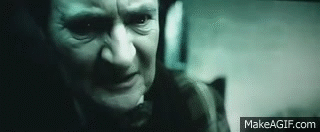
Even Slughorn looks suspect here, which is somewhat appropriate, given that he is complicit in this crime.
Again, this scene is very much intended to be slightly off.
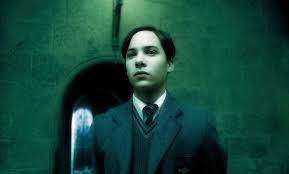
You’ll notice (and I’ll discuss this again when I talk about Coulson’s portrayal) that Dillane is almost always shot from at least slightly below, which makes the lower third of his face look bigger (and thus more menacing). The lighting also makes his eyes glow in a really unnatural way. There’s an echo-y effect to make his voice (and not Slughorn’s) sound unnerving.
People talk about how Coulson would have looked in this scene, and if he was filmed in the same way (monotone, smeary/shadowy filter, and always from below), he’d look a bit creepy, too.
But all of this, imo, is for a pretty good reason. Slughorn isn’t the POV character. Harry is. Harry is learning about how a young Lord Voldemort wheedled the secret of Horcruxes out of an unsuspecting teacher. Unlike in COS, he expects Riddle to be evil. And, so, Harry’s new perception of Tom Riddle literally colors how we perceive him.
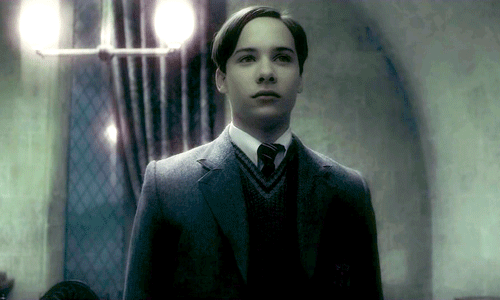
Take this shot, for example: he does that head-tilt thing that Coulson does, and it’s actually... kind of... cute???
Imagine Dillane filmed from slightly above, like Coulson usually is, and it looks even more innocent. (I mean, come on, he does not look like he’s killed four people, does he?) It’s not hard to imagine teachers being taken in by this kind of act.
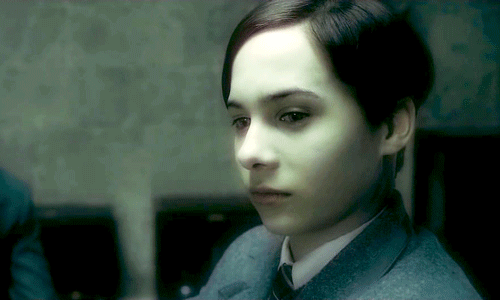
Even that little smirk he does when the camera (aka, Harry’s gaze) pans in, is for Harry’s benefit. No one else noticed that.
However, I still fail to find this creepy, like, at all. Yes, it’s a fake smile, but he’s portraying a different side of Tom Riddle to Coulson. Whereas, in COS, he’s in his vindictive, murderous element, where he’s free to express himself, in this scene, Tom Riddle is doing what he does best -- manipulating and managing appearances.
This entire scene is an act. And because Harry knows it’s an act, it should look a bit stilted.
From the Hepzibah Smith scene in the books: Voldemort smiled mechanically and Hepzibah simpered.
So, Harry is pretty adept at parsing Tom’s fake expressions.
But just look at the expressiveness in his face: he goes from brooding, he blinks, and his entire face changes to this charming (fake) smile.
At the risk of sounding elitist, I’m a bit tired of seeing the word ‘psychopath’, which is not an actual medical diagnosis recognised by any psychological or psychiatric institution, being tossed about, especially with reference to Tom Riddle (and from a neuroscience perspective, it’s doubly annoying). There’s no such thing as ‘insanity’ or ‘psychopathy’ or being ‘crazy.’
-although I use it too a shorthand in conversation to distinguish ‘canon’ Tom from his ‘softer’ OOC counterparts, I really shouldn’t-
Unfortunately, I’ve seen the ‘psychopath’ comment used time-and-time again as an excuse or a full explanation of ‘why Tom Riddle went evil’ (JKR in fact, has made a weird comment in an interview, basically saying that ‘psychopaths can’t be redeemed or learn adaptive coping skills’ or whatever), which really just goes to show the lack of understanding and compassion when personality disorders, especially, are concerned.
But what I like most about the opening of this scene, actually, is that first, listless expression. And this is where we get slightly into headcanon, but Tom Riddle is the opposite of a happy, mentally healthy teenager. By Dumbledore’s own admission, he has no real friends. He has no parental figures, no real attachments. Yes, he might derive some pride or enjoyment from being good at magic and top of his class and all that, but I really don’t think even Tom finds that truly fulfilling. There is nothing that makes him happy.
In fact, although some might perceive it as ‘creepy’, I think that listless expression is an accurate window into Tom’s psyche.
I know people aren’t big on Freud, but I think that he does make some interesting points (also, cut the guy some slack for being relatively open-minded for the Victorian Era, and inventing psychoanalysis and while yes he did say some sexist stuff, good luck finding a field of science that isn’t male-focused and makes crazy generalizations about women, especially back in the day) about the possible origins of thanatophobia, the fear of death.
According to Freud, thanatophobia is a disguise for a deeper source of concern -- he did not believe that people were capable of conceptualizing their own death to that extent. Instead, he believed that this phobia was caused by unresolved childhood conflicts that the sufferer cannot come to terms with or express emotion towards.
Now, I know Freud almost always attributes mental distress to childhood experiences, but I think in this case, it really has some merit.
According to attachment theory, the basis of how we form attachments in adulthood is dictated by learning it from experiences with caregivers in the first two years of life. We know Tom was born in an orphanage, and that he didn’t cry much as a baby, and subsequently, probably received very little attention. Compounded with possible genetic factors and his caregivers being afraid or wary of his magical abilities, he later struggled to form attachments because of this -- I would actually go so far as to say that by the time Dumbledore meets him, Tom Riddle is severely depressed.
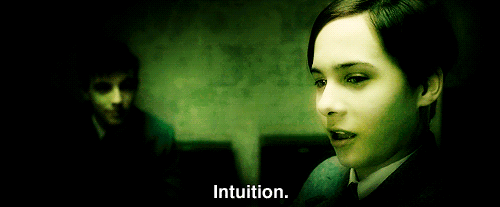
And that flat affect and anhedonia, I think, comes over very well in Dillane’s portrayal. There’s kind of this resignation -- a very deep sadness and loneliness to his character.
Of course, he doesn’t derive any comfort or fulfillment from human interaction, because (to borrow the description from the Wikipedia article on ‘Reactive attachment disorder’, which Tom meets all the criteria for) he has a “grossly disturbed internal working model of relationships.” In other words, he is unresponsive to all offers of attachment because of this unacknowledged trauma.
(You could arguably class Tom as having an avoidant attachment style, but I think in his case the trauma and its effect on him are severe enough to call it disordered.)
RAD isn’t particularly well-characterized (especially neurologically) and quite new in the literature, but here are some links if anyone is interested in doing a bit of digging: Link 1 | Link 2 | Paper 1 | Paper 2
And, instead of trying to resolve this conflict in a healthy way, or at least recognize that this is why he can’t be happy and try to learn how to cope from there, he (a) represses the desire for human attachment and (b) funnels that negative emotion into being the fault of Death, the Grim Reaper (again, to borrow Freudian terms).
And we all know how that turned out...
(And now, this should go without saying, but psychoanalyzing fictional characters has nothing to do with assigning a morality to mental disorders. Mental illness is neither a cause nor an excuse for criminal behavior -- in the same way that the cycle of violence is a phenomenon, not an excuse. Tom Riddle did not become a genocidal murderer because, in common parlance, he was a ‘psychopath’ -- he was not necessarily ‘predisposed’ to evil and could just as easily chosen to not follow the path that he did -- instead, he willingly made poor choices. This is a descriptive analysis, not a justification -- a ‘how’, not a ‘why’)
Here’s a Carl Jung quote that articulates it better:
“I am not what happened to me, I am what I choose to become.”
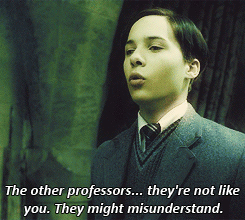
Yes, he’s a bit stiff (and a lot more formal than in COS during his *conversation* with Harry). But, and here comes the controversial bit, this is appropriate for a portrayal of a schoolboy in the 1940s. The upright posture is accurate -- respectful, polite -- everything Tom Riddle would have been expected to be (and even Coulson, in that scene with Dumbledore in COS, is quite stiff). Even the way he looks at Slughorn and maintains eye contact is very *respectful.*
And, Dillane (I think he’s seventeen or eighteen here) actually looks like a believable sixteen-year-old. I’m sorry, I love Coulson’s portrayal as well, but he looks around nineteen in COS; so in HBP, he probably would have looked at least twenty-two or so. (Sorry, not sorry).
This may be influenced by my own interpretation of the character (because I imagine Tom always looks young for his age, and Dillane fits that archetype, but I don’t think that’s very popular), but I think young Tom Riddle is supposed to be *cute* and a bit stiff/shy/awkward (being charming and awkward is very much possible), if you consider the way Dippet and Slughorn treat him.
To support this, he says very few words to Hepzibah Smith (in the book, that scene’s not in the movie), and is very... bashful and coy during the whole interaction? I think yes, he’s charismatic, but he’s not loud, suave, openly flirtatious or particularly verbose. Tom Riddle should have a quiet magnetism, and to me, that came across in Dillane’s portrayal.
"I'd be glad to see anything Miss Hepzibah shows me," said Voldemort quietly, and Hepzibah gave another girlish giggle.
...
"Are you all right, dear?"
"Oh yes," said Voldemort quietly. "Yes, I'm very well. ..."
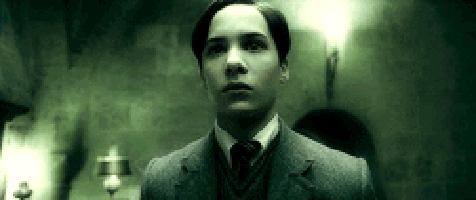
Even the ‘ugly, greedy look’ described in the books, when Slughorn starts spilling his secrets, is there. This is how he’s supposed to look! Slughorn glimpses it, but doesn’t understand its significance. Harry does.
“Slughorn looked deeply troubled now: He was gazing at Riddle as though he had never seen him plainly before, and Harry could tell that he was regretting entering into the conversation at all.”
Remember the context of this moment, as well: He’s just discovered how to create multiple Horcruxes. Excuse him for looking a bit creepy (if not now, then when?).
Here’s two direct quotes of Harry’s impression of Tom Riddle in that scene:
“But Riddle's hunger was now apparent; his expression was greedy, he could no longer hide his longing.”
“Harry had glimpsed his face, which was full of that same wild happiness it had worn when he had first found out that he was a wizard, the sort of happiness that did not enhance his handsome features, but made them, somehow, less
human. . . .”
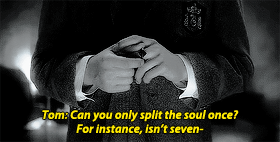
Tom Riddle’s Horcruxes are a direct metaphor for his refusal to allow himself to heal from his trauma -- instead, he continues to inflict destruction on himself and others.
His desire to continue creating more Horcruxes sort of resounds with the fact that self-harm can also become a compulsion.
I’d also like to digress a bit to discuss the Gaunt Ring, while we’re at it. While we’ve talked about his attachment issues in general, this discussion is particularly pertinent to father figures. And while Tom’s attachment issues are extensive, I think there’s ample evidence that as a child, he craved acknowledgement and acceptance from a father figure -- the man who gave him the only thing Tom truly owned -- his name. He would have had a vaguely defined mother figure in Mrs. Cole, perhaps.
"You see that house upon the hillside, Potter? My father lived there. My mother, a witch who lived here in this village, fell in love with him. But he abandoned her when she told him what she was.... He didn’t like magic, my father ... He left her and returned to his Muggle parents before I was even born, Potter, and she died giving birth to me, leaving me to be raised in a Muggle orphanage ... but I vowed to find him ... I revenged myself upon him, that fool who gave me his name ... Tom Riddle. ..."
We know that by June of 1943 (COS flashback) Tom has already uncovered the truth of his parentage; he knows he is the Heir of Slytherin via the Gaunt line, and he describes himself to Dippet as ‘Half-blood, sir. Witch mother, Muggle father.’
In Part 1, I discussed the high probability that as a presumed ‘Mudblood’, Tom Riddle was treated rather poorly in Slytherin House. But by this scene in the fall of 1943, he is surrounded by a group of adoring hangers-on. Why?
In my opinion; the Gaunt Ring. We know that Tom stopped wearing it after school, so its sentimental value couldn’t have been that great. We know he likes to collect objects (which I believe stems from his attachment issues -- he seeks comfort in things instead of other people).
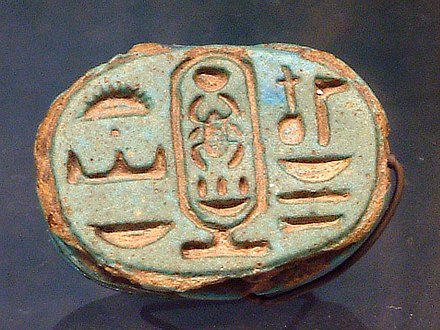
Signet rings (such as the one belonging to Tutankhamun seen above) were used to stamp legal documents and such, in order to certify someone’s identify -- like an e-certificate, if you will. Like Tutankhamun’s ring, the Gaunt Ring bears an identifying symbol -- Marvolo Gaunt tells us proudly that it bears the Peverell family crest.
By the Middle Ages, anyone of influence, including the nobility, wore a signet ring. Rings in antiquity were auspicious -- they signified power, legitimacy, and authority. And so, I believe that all the Sacred Twenty-Eight families would have worn these, too.
And so, bearing the Gaunt Ring would have established Tom Riddle, symbolically and in the eyes of the Sacred Twenty-Eight (his future supporters and followers), as the legitimate heir to the House of Gaunt. This is why, I believe, Tom coveted the ring as soon as he saw it -- not just because it was a family heirloom, and not just because he thought it was a pretty toy for his collection.

(He curses it so that no one else but him can wear the Gaunt Ring safely.)
This is why, to make the legitimization literal as well as symbolic, Tom murders his father and grandparents. It’s not just an act of vindictive, murderous rage due to his perception of being rejected by his father (although it is that, too). And so, Tom, abandoning his search for a father figure (and possibly also giving up on the possibility to allow himself to heal from his own personal trauma rather than continue to inflict it on others), ‘cleanses’ his bloodline, to make himself truly legitimate. It’s rather telling that instead of affirming his legitimacy as a Riddle, which would have put him in line for a nice inheritance, and hey -- money is money -- (thus accepting his half-blood status), he simply kills them all. He has done all the murdering he needs to become immortal (and he hasn’t had the discussion about multiple Horcruxes yet); but yet, he does it again. Frightening stuff.
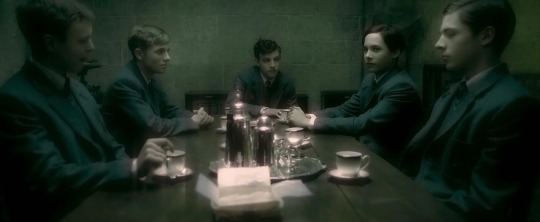
(Just look how the others look at Tom. All but the one to his left -- possibly Nott, Rosier, or Mulciber -- have their torsos turned towards him. Their attention is on him, while he knowingly regards the viewer/Harry. Tom seems a little uncomfortable with the attention.).
“And there were the half-dozen teenage boys sitting around Slughorn with Tom Riddle in the midst of them, Marvolo's gold-and-black ring gleaming on his finger.”
...
“Riddle smiled; the other boys laughed and cast him admiring looks.”
...
“Tom Riddle merely smiled as the others laughed again. Harry noticed that he was by no means the eldest of the group of boys, but that they all seemed to look to him as their leader.”
The ‘gang’ are true hangers-on; Tom doesn’t seem to pay them much attention.
So, if not via careful flattery or charisma, the attraction must be status.
And perhaps yet more telling...
"I don't know that politics would suit me, sir," he said when the laughter had died away. "I don't have the right kind of background, for one thing."
“A couple of the boys around him smirked at each other. Harry was sure they were enjoying a private joke, undoubtedly about what they knew, or suspected, regarding their gang leader's famous ancestor.”
That, in my opinion, is as good as we’re going to get as proof that Tom’s shiny new signet ring (and by extension, his new status) made a big impression on his fellow students.
So, when he returns to Hogwarts, he is ‘pureblood’. He is cleansed of his Muggle roots, and becomes the legitimate heir of the House of Gaunt, now well on his way to becoming Lord Voldemort...
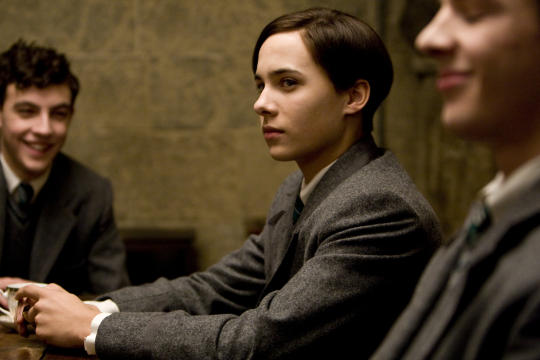
Watch the scene again, with a critical eye, and imagine Slughorn’s perspective, instead of Harry’s. There’s nothing creepy about Tom Riddle... unless you know what he is...
Strip away all the effects of Harry’s gaze (and notice, here he’s still looking at Harry), and he’s quite the charmer, actually.
(I will concede that I don’t like the promotional images where they have him looking like he’s up to no good. And I do wish he blinked once in a while.)
My challenge to you: Rewatch the scene with an open mind, and let me know if you agree that Dillane’s portrayal comes off as depressive rather than ‘creepy.’ And if not, why do you dislike his portrayal?
#tom riddle#character analysis#character study#the many faces of#tom marvolo riddle#frank dillane#i literally could not find any pictures other than these#literal crumbs i swear#i know this is unpopular#people really dislike him i guess#watch the scene again with an open mind i promise you'll like it#i seriously do think he did a good job#tw: mention of child abuse#tw: mention of self-harm#i'm not trying to oversimplify things but you can't deny that maybe if tom was hugged as a child it would have helped#say it with me: psychopathy is not an actual medical diagnosis#it's actual more of a legal/criminal justice term#and people just use it as a synonym for 'evil' at this point so the original meaning is pretty much obscured#and personality disorders should not be moralized#people with personality disorders are not 'evil'
89 notes
·
View notes
Text
This Was Not A Dare, Reigen
Jon glares at each of the— the suspects traitors in front of him, tape recorder clutched tight in one hand.
Martin, wringing his hands uselessly, eyes wide and beseeching. Tim, fists clenched hard enough for his knuckles to go white and returning his gaze with a death stare of his own. Sasha, arms folded to form a barrier between Jon and herself, expression a perfect mask of concern. Reigen, radiating disappointment in every one of his gestures and quips. Elias, eyes weary, fingers rubbing the bridge of his nose.
Some intervention this is turning out to be.
Jon wants to scream. Wants to reach out and shake someone, anyone, until they admit he’s making sense and it’s the rest of the world that’s gone mad.
Every single one of them (except Martin) could’ve killed Gertrude. He knows he has no proof that they did, but he has no proof that they didn’t either, can’t they see that? If they don’t want him to suspect them, it should be easy for them to actually give him proof of their innocence (like Martin did), instead of just repeating platitudes of “you know this isn’t acceptable adult behavior, Jon” and “you’re better than this, Jon”.
Who cares about knowing better or acceptable behavior when it’s your very life on the line? He’s half tempted to throttle the con artist, see how dignified or adult he is when he’s the one with a murderer on his tail!
…Not that Jon is a murderer. It’s just the principle of the thing, is all.
“Jon,” Elias says, tone soothing in all the ways he doesn’t want it to be. “This is absurd. This goes far beyond an unhealthy work environment. I’ll admit it’s partly my fault for letting it get this bad, I should have intervened earlier.”
Reigen cuts in with a hand gesture that is as effusive as it is dismissive. “That doesn’t make his behavior okay, Bouchard-san. It may be bad here, but Jon chose to follow me, Tim and Sasha, and yell at Martin, rather than going to the police or paying a detective, like Herlock Sholmes or something.”
Jon sputters. “Wh- It’s Sherlock Holmes, not—and he’s fictional!”
Reigen blinks sleepily, one eyebrow raised. “Oh? That doesn’t sound right. Are you sure?”
“Yes!” Jon all but shouts, rapidly reconsidering his stance on braining the sardonic little git with his tape recorder. “Don’t you even—an-and you’re deflecting again! Just like with your ridiculous ‘haunted gun’ nonsense!”
“I’m not!” Reigen says, clearly deflecting. “I’ve seen this kind of thing loads of times as the number one psychic. When a weapon kills lots of people over 100 years, the bad energy gets bigger and bigger until the gun grows an evil spirit and is hungry—”
“I refuse to believe Gertrude Robinson was murdered by a sentient blunderbuss!!”
“Be that as it may,” Elias interrupts, shooting them both a stern frown. “This is exactly the kind of thing I was talking about, Jon. Given how badly it’s affected your work ethic, I will be taking direct action to ensure it does not continue.”
Jon can feel his shoulders hunch almost against his will, dread pooling in his stomach at the thought of whatever punishment is about to be unjustly inflicted on him.
Only Martin looks half as worried as he feels, glancing between him and Elias nervously. By contrast, Tim looks downright triumphant, smirk nasty and vindictive. Sasha’s somewhere between those two, not openly celebrating his soon-to-be-downfall, but not acting like she’d lift a finger on his behalf either, though he’s unsure why that feels like it should surprise him. She’s always been as neutral as Switzerland.
Reigen, oddly enough, has more in common with Martin than with Tim. He’s staring at Elias like he’s waiting for a bit of news he knows he won’t like.
Jon thinks he’d appreciate that more if he wasn’t about to be unfairly lambasted simply for trying to stop a murderer and bring justice for an old woman who probably died frightened and alone. Much like Jon probably will once he’s been hobbled by whatever Elias is about to say next.
“Such as by restricting access to the archives from members of the public who are ultimately doing you more harm than good.”
…Wait.
What?
“What?!” Tim, Martin, and Sasha echo.
Reigen glances between them all, blinking in confusion.
Jon shares the sentiment entirely. His punishment is…for someone else to be removed from the archives? Someone he doesn’t employ or even like that much, no less?
He must have misheard, surely.
Though maybe not, given how Tim looks aghast, glancing between Elias and Reigen. “Okay, no, Reigen’s clearly not the problem here—”
“I’m very sorry, Tim, but Jon has made several remarks about the disruptive nature of Mr. Arataka’s presence in the archives.” Elias sighs. “From the arguments like the one we just witnessed to the nonsensical purchases of oddities inspired by his presence, such as Duolingo subscriptions,” Meaningful glare at Jon who resists the urge to clutch his phone guiltily, “That are now billed on the Archives’ expenses, it unfortunately seems as though he is dragging down productivity for all of you as an active stressor.”
“But we’re much better equipped to take statements from people who don’t speak English because of that!” Martin protests, stepping forward. “Isn’t it an advantage to have a more, more international perspective for our work?”
“One positive in a sea of negatives does not an advantage make.” Elias says, sounding infuriatingly like he’s misquoting something. “And really Martin, how realistic is it that this would help in more than a few isolated cases? I expected better from you.”
Martin’s face crumples, and his shoulders hunch, making himself smaller.
Jon finds his own mouth opening to—what? Say something? What would he even say?
Luckily, Sasha intervenes before he can dig his own grave further. “That’s as may be, but he’s a wonder for morale. He and Jon are funny, not anything serious, and I don’t think we’d have come to you about Jon‘s behavior unless he encouraged us to—”
“Which only fits into the delusion where Jon feels an outsider is rallying his subordinates against him, which is not good for his paranoid outlook.” Elias replies calmly. “And it’s never a healthy work environment when one employee feels the others are making them the butt of a joke.”
“I’d say that’s not as bad as when the boss feels he has the right to violate everyone’s privacy whenever he wants to just ’cause he’s feeling sad!” Tim growls.
Elias begins to answer, before Reigen finally speaks up.
“Sorry,” The con artist says carefully. “But you are…«I know this one…» banning me from the Archives? Yes?”
“That is the long and short of it, yes.” Elias says, grudgingly
“Why?” Reigen challenges, eyes hard and searching. “What have I, personally, done that’s wrong here? What behavior do I need to correct?”
There’s a moment of silence. The whirring of the tape recorder sounds uncomfortably loud.
“Mr. Arataka, are you currently under the employ of the Magnus Institute?” Elias asks, brow furrowed.
“Ah, no, no, but—”
“Are you looking to become employed by the Institute at this point in time, as a prospective member of the Archival Staff?” He fires off rapidly.
“Su-Sorry, but if you could just go a little slower—”
“Then I am afraid that unless you’re looking to fill out an employment contract or a Statement form, we cannot help you, Mr. Arataka.” Elias spreads his hands wide. “We are an academic institution, a place of research and learning. The Institute cannot allow for social dalliances on company time, especially not when those visits are negatively contributing to the work environment and the wellbeing of our staff.”
Tim throws up his hands, “I-I cannot believe this!”
Reigen’s mouth works soundlessly for a moment.
“Arataka is my…what do you call it? First name?” He says, at last. “Using it in this context is…inappropriate. Please call me Reigen, if you would, Bouchard-san.”
“Of course. My mistake, Mr. Reigen.” Elias does have the decency to look somewhat abashed. “Though, regrettably, I am going to have to ask you to leave the premises within the next twenty minutes, or I will be forced to call security.”
Reigen nods, jerkily, hands stuffed in his pockets.
Jon almost wants to call out to the fraud as he turns to go, grab him by the shoulder, pick another argument, something. He knows he should be happy, be glad that this thorn in his side will finally stop bothering him, but instead he just feels—befuddled. Off-kilter.
What happened to the man who once spent three hours arguing for the “spiritual effectiveness” of entirely performative and useless rituals, saying that ensuring his clients left his office fooled and contented was better than actually uncovering genuine supernatural forces and learning all there was to know about them? Why is he going so-so easily now, when he’s made Jon fight tooth and nail in every debate he’s had with the so-called psychic?
At the door, the con man pauses.
“Bouchard-san. You said I could come back if I had a statement to give?”
Elias shifts in his seat, looking bemused. “W-well, yes. That is a service we do provide. Of course, the statement would have to be genuine, and verifiable as such before we let you back into the Archives.”
“We don’t even do that for most of the rubbish we do take,” Tim mutters under his breath, and though Jon is glad he’s not the one being shot a quelling look, he does have to agree.
The con man turns back.
He’s got that smirk on his face that immediately puts Jon’s hackles up on instinct, prepared to argue against whatever inane point he’s come up with now to defend his phony psychic title.
“Gotcha.” Reigen says, far too cheerfully. «Ja ne.»
Then he strolls out of the office, as cool as a cucumber.
Jon could even swear he hears him whistling as he makes his way down the stairs.
There’s a moment of stunned silence.
“I’d do him.” Sasha pipes up, unhelpfully.
“Sasha!” Martin hisses, scandalized. “D-don’t you have a, a—”
“Oh, I don’t have to worry about that.” She remarks, far too blasé for someone in a newly committed relationship. “Tom’s heard about him too, and he agreed he’s just our type.”
“And I’m not?” Tim jokes, but there’s a hard edge to it that Jon’s found himself increasingly familiar with in the past few weeks.
Sasha shrugs with a mischievous little smile, as if that mattered very little to her.
Elias coughs. “Right. Well. Whatever your relations to Mr. Reigen are, please try to limit them to outside the workplace in future.”
The rest of the intervention is surprisingly subdued. Elias gives Jon access to the footage from the cameras in the rest of the Institute, and Tim bodychecks him on the way out of the office, muttering about how nice it must be to never face any consequences for his actions. Sasha follows, the way she won’t meet his eyes a condemnation in its own right.
Even Martin doesn’t say anything to him, just bites his lip and hurries past back down to the Archives. It doesn’t sting. It doesn’t.
Even as he settles in to watch and rewatch the CCTV records of Gertrude’s last week alive, Jon can’t shake the ridiculous feeling of foreboding that’s dogged him since Reigen left.
Most of him wants to say it comes from the fact that despite the fact that Reigen has not appeared in any of the camera records for the Magnus Institute before he started his term as Head Archivist in 2016, isn’t banning him from the Archives just letting the con man run around London with impunity, with no way for Jon to ascertain his movements or motives? That instead of solving a problem, Elias has just given a potential murderer free reign to escape?
But a small part of Jon, one that never could deny the sensation of being watched, that is frozen in second-hand terror whenever he reads a Statement, knows, Knows that it this stems more from the idea that the fraud will actually accomplish what Elias has unwittingly challenged him to do.
The illogical but pervasive surety that he will do so.
Jon’s not sure if he’s more afraid that Reigen Arataka will vanish entirely, another unfortunate victim become an unsolved mystery.
Or that he’ll come back, and bring whatever he’s managed to unearth on his insane quest with him.
#the magnus archives#tma#mob psycho 100#mp100#reigen arataka#mp reigen#jonathan sims#jon sims#martin blackwood#timothy stoker#elias bouchard#not sasha#tma not them#tma s2#jonmartin#(just a little)#(as a treat)#Elias: you cant come back unless youve been traumatized#Reigen: challenge accepted#Elias: wait no—
25 notes
·
View notes
Text
so some time ago, someone asked me to do meta about a scene in Injustice and i wanted to revisit that scene with the scene from Year Zero in mind. and then i ended up getting deeply into injustice damian, his relationship with his two awful dads, and it’s kind of a mini character essay?
so! here’s a warning for: tyrannical totalitariam regimes, child abuse, abusive fathers, emotional manipulation, evil superman, character death & also random he-man. please note that this is entirely about injustice and its characters, which are not a reflection on their mainstream counterparts.
there’s tension between damian and bruce from the get-go in injustice, and we’re never really told why. if we take cues from the game (though that entire scene doesn’t make sense) then it’s because bruce didn’t save jason, which fits in with my reordered robin theory in which tim and jason were switched, and jason has only recently died.
now, we don’t know whether jason is running around as red hood right now or not. but i’m inclined to say he isn’t, as his injustice 2 ending makes a big deal of him becoming red hood. and damian is close with jason in injustice 2, close enough that jason listens when damian tells him that he’s a lot more than bruce thinks he is and drops the shitty batman costume. close enough that during the (extremely weird, extremely out of alignment with the comic) scene in injustice 2 where damian betrays bruce for clark, jason is the name damian throws at him with the most vehemence. regardless of the robin ordeer, bruce’s failure to save jason is seems to be an incredibly sore point between them.
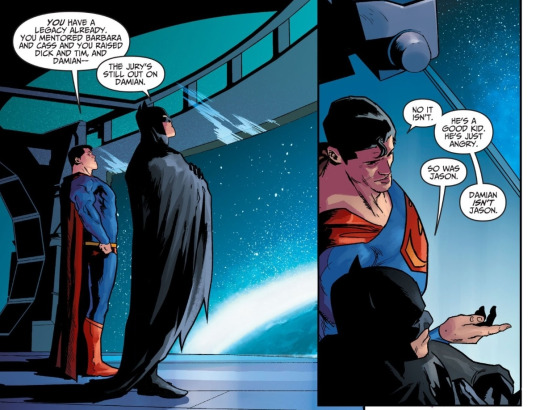
so it’s interesting that bruce is already counting damian out before injustice even starts. he’s comparing damian to jason - someone who he apparently no longer considers part of his legacy.
the kicker is: damian in injustice is actually probably the most morally centered version of himself. he shows open compassion and care for other people more often than he does in most of the mainstream runs. damian’s sense of right and wrong is solid, but what he wants is to break the cycle that gotham is trapped in. which from his perspective, is something bruce doesn’t seem to want to do.
injustice’s version of bruce is someone who truly believes that the ends justify the means - which means he’s apt to do some heinous things to people until they see his side of things. he seems to view people questioning as an act of betrayal, so instead of ever explaining himself he resorts to things like installing viruses in cyborg, kidnapping hawkgirl and replacing her, beating allies within an inch of their life - all of it is fine to him so long as they’re not dead.
but it’s not fine to damian. damian is constantly horrified at the lengths bruce will go to.
damian is afraid of his father.
so, this is about a specific scene. let’s get to that scene. its just important to note the difference between them, and emphasize that he’s not going with any intent to fight. if he was going to do that, he wouldn’t be doing this:
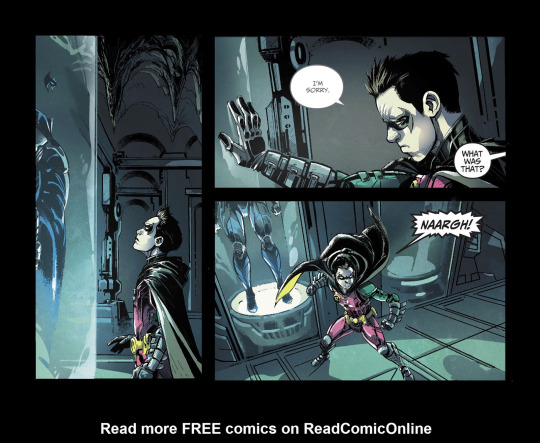
or respond like this:
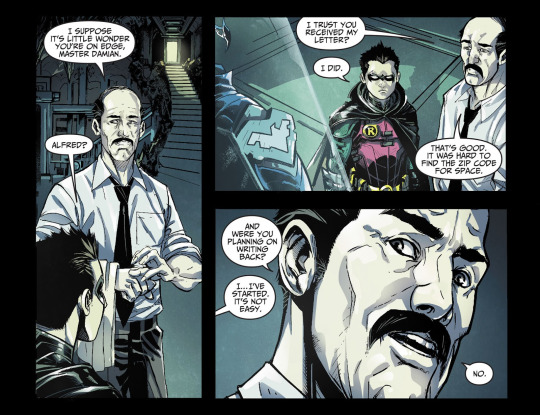
or this:
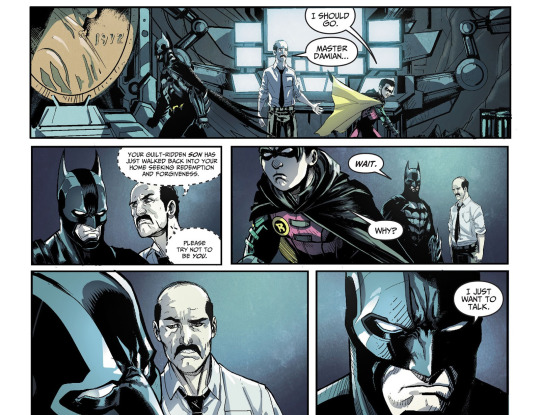
he’s there to make amends, or at least try to. he still loves his father and he wants to be forgiven, and this is something that will carry on ten years later in injustice 2. damian made the choice to oppose bruce’s controlling nature but damian didn’t choose to abandon him and the bat family permanently. that choice was made for him. damian wants to come home.
and he’s terrified of his father. i cannot stress that enough. bruce at this point has already shown that he knows how to hurt his closest friends if they oppose him.
damian is a highly trained fighter, but he’s also a thirteen year old boy who knows he can’t overpower a man twice his size and weight.
and bruce?
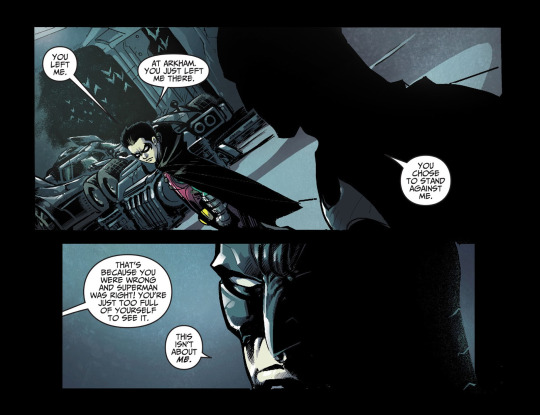
bruce’s entire argument really hinges on ‘you, my thirteen year old son, didn’t take my side in this argument’. because, i have to put this in bold, the league was not executing the criminals they were removing from arkham. they were just transferring them to a more secure facility. something which is actually sorely needed, especially given what has just happened to metropolis. arkham isn’t fit to house them. and as far as damian sees it, bruce doesn’t like it because it’s removing an element of his control.
now, bruce isn’t wrong about how things will escalate.
but damian’s not wrong about his motivation here. i think there’s a conversation to be had about how bruce’s methods in trying to stop the regime actually drove it to further and further extremes. bruce never tries to talk to clark - or anyone, really. he just starts playing mind games to make them do what he wants.
it harkens back to the conversation bruce and dick have in the batplane. that bruce doesn’t talk to people, he doesn’t explain himself. he’s either right or you’re wrong and he won’t explain his stance. there is never room for debate. he’ll just stop talking and leave until you agree. there is no option where he sits and listens to an open and honest dialogue, no scenario where he entertains that he might be in the wrong or maybe things aren’t black and white.
and that’s why injustice bruce is not a good guy.
even on prime earth, damian had to bend over backwards to prove to bruce that he wasn’t a monster. it was damian who spent months digging through the sewers for martha’s pearls. damian who had to prove he was capable of loving titus. damian who constantly had to show that he was capable of empathy and thinking of others - bruce did none of the heavy lifting in that father-son relationship, he made damian climb the entire hill and still continues to put little effort into it.
and injustice bruce is even less empathetic and expressive than prime bruce.
which is why you get a confrontation like this:
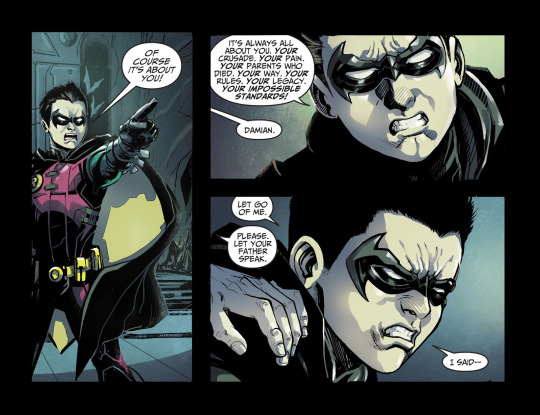
this goes beyond dick’s accident and ties back into what clark said about bruce not tending to his son’s who are grieving because they lost friends in metropolis. damian’s fed up with never meeting bruce’s expectations. but more than that, he’s fed up with his feelings coming second to bruce’s.
bruce has already made a judgement on who and what damian is. damian has the potential to be dangerous and requires work to fix, and so he’s not interested in getting to know him beyond that. he tells dick that he’s “worried about damian being seduced by darkness” but never talks to damian himself with him about it.
but clark has looked at damian and and decided that damian is good. damian has problems, clark can admit that and does, but damian is good. like bruce himself.
and ultimately why when dick dies, clark is the one that reaches out to him because he sees damian for what he is: grieving child who just made a terrible mistake. it was an accident. damian didn’t mean for this to happen. meanwhile, bruce feels as though he was proven right. damian was dangerous and now his real son is dead. bruce will later admit, once he stops trying to manipulate damian, that damian was dead to him the moment dick died.
going back to year zero for a minute, they subtly show that damian is doing his best to be like bruce. baby damian idolizes his father. so i imagine a lot of bruce’s own feelings towards damian stem from self-hatred. from bruce seeing himself in his son and not liking the reflection it forces him to confront. injustice bruce projects a great deal of his own insecurities and shortcomings onto his youngest. damian is his worst what-if.
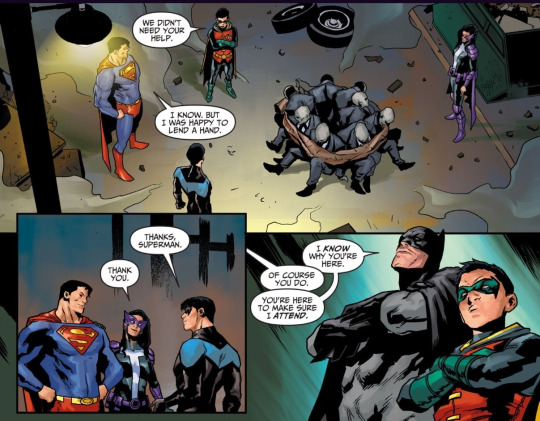
even though damian doesn’t deal with his grief the way bruce does. there are similarities, he puts his feelings into his fists and hits. just like bruce. but unlike bruce, and most likely because of dick, he does try to communicate. come injustice 2 he even talks about his feelings.
that doesn’t justify any of the violent outbursts. and he has a lot of them. he has significant issues with controlling his anger and struggles with lashing out, verbally and physically. it both worsens and improves as he gets older.
damian knows that he’s more than his grief, his loss, his anger. he’s also compassionate and capable of incredible feats of kindness. we see that in the flashback chapter in injustice 2. people aren’t pawns for damian, they aren’t a means to assuage his own guilt and validate himself as a good person. he wants to be good for those people.
damian’s relationship with heroism isn’t built on an intrinsic need for control or power, nor is it a means of validating his self worth.
people just need him. they’re suffering. and he wants to be there for them.
but again, we’re not there yet.
so, alfred reaches out to touch damian. damian asks him repeatedly to let go. when alfred doesn’t, damian tries throwing him off, not realizing how much strength he now possesses.
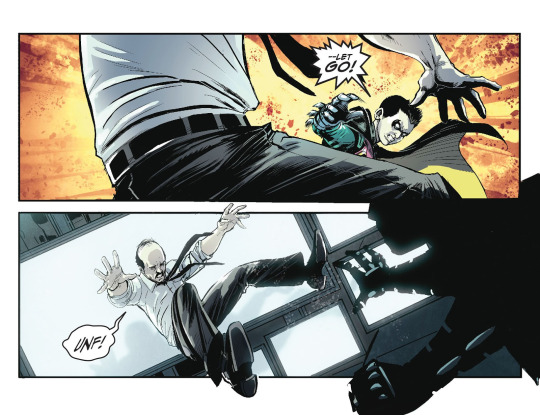
damian has a thing about being touched when he’s wound up tightly. it almost always ends with him lashing out at someone. which, tying back into why he felt comfortable coming back here, probably goes into his expectation that he’s going to get the lights knocked out of him. because again, damian did not go to the cave to fight or hurt anyone. the pill is entirely for his own defense.
from what we know of damian’s childhood in both prime and injustice, violence is the expected retaliation for misbehavior. toeing out of line is grounds for getting the shit beaten out of you, and while things should be different here....
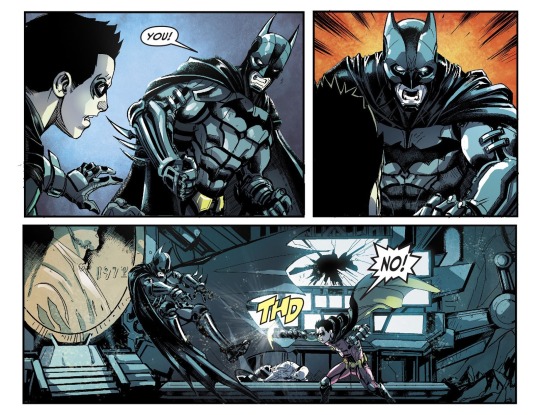
from how bruce reacts he’s not wrong to expect it. note that bruce dodesn’t run to alfred to see if he’s okay, he goes after damian for hurting him. it’s damian who runs to alfred after he’s thrown bruce away from him.
( granted, yes, he threw bruce into the penny and it almost crushes alfred )
damian apologizes and he means it. alfred’s first question is to ask for bruce.
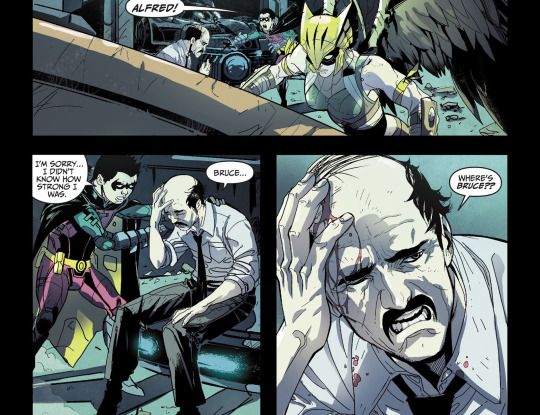
“”hawkgirl”” intervenes to try to end this fight before it can escalate further.
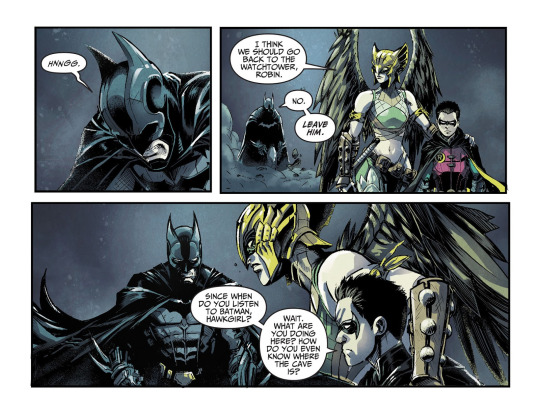
damian deduces that this isn’t hawkgirl and blows some stuff up. bruce calls after him probably - not to have a serious heart to heart with him about what just happened, or what happened in arkham, but to try to manipulate him into taking bruce’s side or in the very least stop his ruse from being uncovered.
this is a theme moving forward. bruce will dangle forgiveness in front of damian, but only when it benefits him and can be used to control him. eventually he’ll stop and will use the guilt he knows damian feels to wound him.
and here’s the second theme it introduces: damian is scared shitless of his father. he’s not afraid of bruce’s violence, as after this he charges straight for him time and time again, but he is utterly terrified of the lengths bruce will go to get his way.
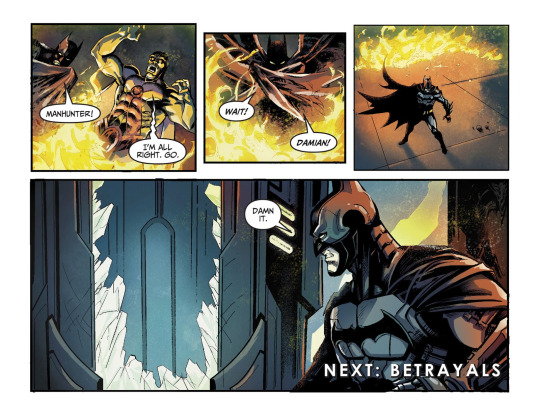
this is also where he takes dick’s suit. i think this was his way of telling bruce that he didn’t deserve to use dick’s memory the way he uses his parent’s death - as justification for what he does. this comes up in injustice 2 later down the road, damian will bring up that bruce uses his pain to justify how he brutalizes the people around him. damian does the same thing -- but we also see damian grappling with his conscience about it. he wants to be better. he doesn’t want to be all his violence and loss.
back to the topic at hand, damian doesn’t do anything with dick’s suit. unlike bruce, damian doesn’t wear his grief and guilt in plain sight. he puts it in a box and doesn’t look at it, he covers the wounds with anger and as he gets older, develops a death wish and basically begins seeking a noble death in order to make up for what he’s done. it isn’t until dick passes the mantle to him in an attempt to steer him back on the right path that he even looks at it again.
damian isn’t the one that ended his relationship with bruce. bruce did. damian is very willing to reconcile if bruce genuinely wants it, but bruce doesn’t bother with damian outside of combat or when he needs something. damian actually keeps up visits with alfred, he gets him birthday presents, they meet up often and despite their opposing viewpoints, they get along just fine. damian even listens to what alfred says. he still loves his family.
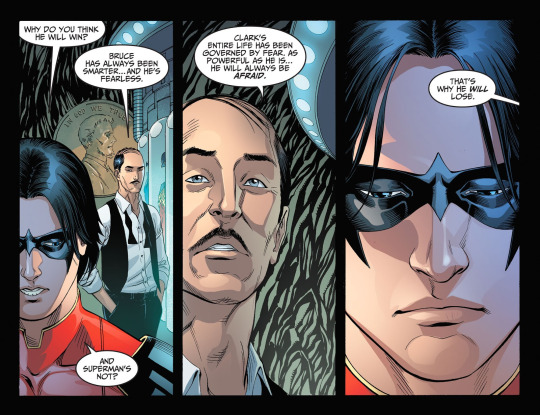
damian himself is a mess. this line resonates because damian, too, is afraid. afraid of bruce, afraid of being what bruce thinks he is. there’s only so far he can bury it under the anger.
by the next issue of year one, after the confrontation at the manor, damian’s discarded any notion that bruce is a good person or justified in anything he does. everything he says on this page is true.
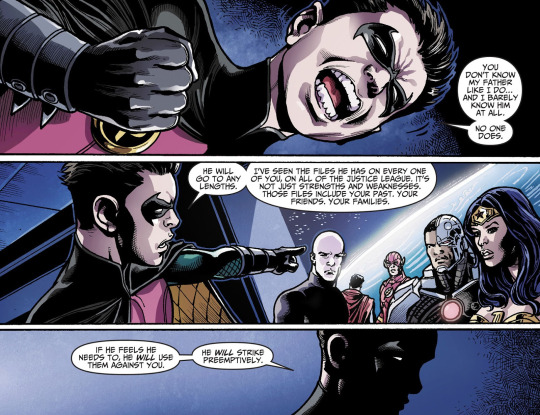
he’s not wrong. he’s more than bruce has even given him credit for being. injustice bruce sorts people into boxes impossible to climb out. damian made his attempt at reconciliation and instead, found out that bruce has kidnapped and replaced one of his friends to spy on all the rest. in that split second when bruce came at at him, he saw the disgust and anger in his eyes. he’s seen how bruce sees him and wholeheartedly rejects it.
he doesn’t want to be bruce. he will not be bruce.
batman was supposed to be better than the league. it was supposed to be a new way. instead he just found a new, different means to brutalize and control, and a new way someone justifies causing harm. and he doesn’t want it.
this isn’t to say that damian is a saint. he’s a very flawed, very broken person. he went from one abusive parental situation, to another, to another, and has the damage to show for it. he’s got bad habits from all of them, many of which he isn’t aware of or doesn’t think are a problem.
but unlike his two dads, damian doesn’t close himself off to what he’s feeling completely, nor does he decide to rush towards external solutions for his pain. he’s, again, very aware that something is wrong. he doesn’t hold to his convictions the same way bruce or clark do, he questions. he’s deeply unhappy with who he is and what he’s doing.
but damian is seeking answers using a very limited toolset, and there’s a very limited pool of people he can ask that won’t give him a biased answer or try to manipulate him for their own means. one of the people he confides in does just that.
the other gives him the honest truth.
his relationship with selina is fraught and she’s often one of the very nastiest people towards him, but it’s because of that he ends up opening up to her. she isn’t going to bullshit him and just say what he wants to hear.
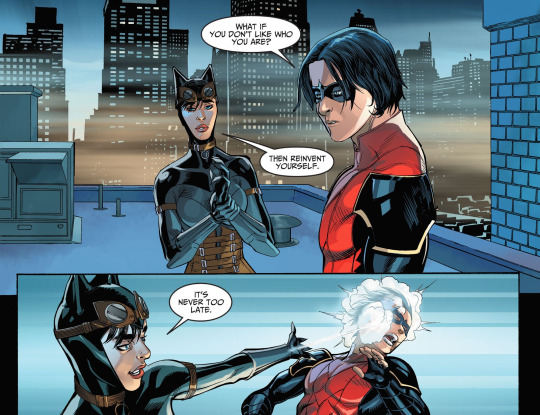
and this is what makes damian different from them. both of them.
because he stops, because he questions, he’s still connected to reality. to his own humanity.
injustice’s bruce is a bruce that has quietly let his humanity die. he’s completely given over to the cold logic of batman and the idea that whatever he does to the people around him, no matter how morally dubious, is justified so long as it means protecting lives. he might not kill, but he really stops just short of that. he just doubles down on his beliefs and takes anyone who doesn’t agree with him as a traitor. he will go out of his way to rationalize how a largely guilty person is innocent (harleen) and how a largely innocent person is guilty (damian). and so he uses damian’s “betrayal” - ie, damian standing with clark instead of him - as justification for icing him out. that way he can ignore all the people who have reminded him time and time again that it was an accident.
bruce also can’t stand that damian won’t do what he says. bruce will ignore damian unless it benefits him. bruce will go on to frequently weaponize how badly damian wants forgiveness against him. there are multiple instances where he says “just do as i say and i’ll forgive you, son.”
and then in the next breath, he’ll tell damian that he “can’t forgive the deaths”, all the while he has harleen as his new sidekick. it’s fine that harleen helped with the scheme to blow up metropolis, killed jimmy olsen, and countless others. it’s not fine that damian did something he did all the time to dick - something dick himself shrugged off, because the expectation for this behavior was that dick would catch the baton - and it ended in tragedy.
because harleen listens to him and damian doesn’t. bruce cuts damian neatly out of his life and only really cares about him again when he’s a corpse.
damian, meanwhile, never stops trying to earn bruce’s forgiveness. in the canonical bad end (or well a comic offshoot of the canon ending) damian essentially dies begging bruce to forgive him, admitting that he always cared. he launches an absolutely insane rescue mission to save his father from clark’s torture and it costs him his life.
( but it’s worth mentioning - it takes damian showing bruce an image of kara for bruce to acknowledge him. )
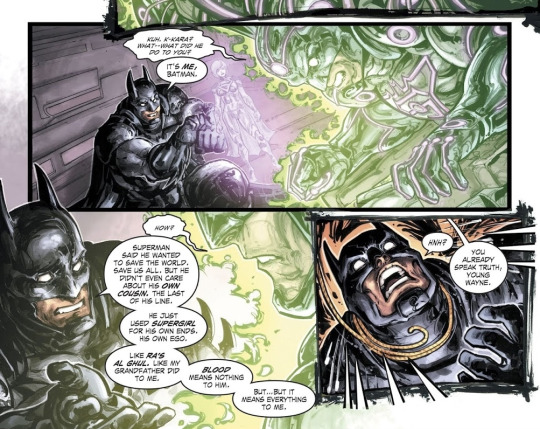
even before this, damian was looking out for bruce in other ways. he was the reason selina got involved with the regime. because he offered her the chance to join and save bruce. damian’s anger towards bruce is less that he wants him dead, and more that bruce won’t stop unless he’s killed.
and damian is willing to kill him if bruce poses a threat to his ‘new’ family. he’s not going to watch bruce hurt the people he loves.
but his new father sucks just as much as his old one.
talia and bruce were more obviously abusive parents. they were controlling and sometimes asserted that control and obedience using physical violence and intimidation. in obvious ways you can point to and see abuse.
damian doesn’t recognize clark is using him until he sees clark discard kara, who should be everything to clark and is someone important to damian. before that, he has inklings that they’ve gone too far, but clark has been such a paragon of good that when he tells damian not to worry about it, he doesn’t. he hides all his darkness behind that smile and tells damian he’s good and worthy of people loving him, that they’re saving people and they won’t let another metropolis happen. clark talks to him and still (seems to) accept him even when they disagree.
damian misses clark’s equally as abusive tendencies because they hidden under the guise of a fatherly concern.
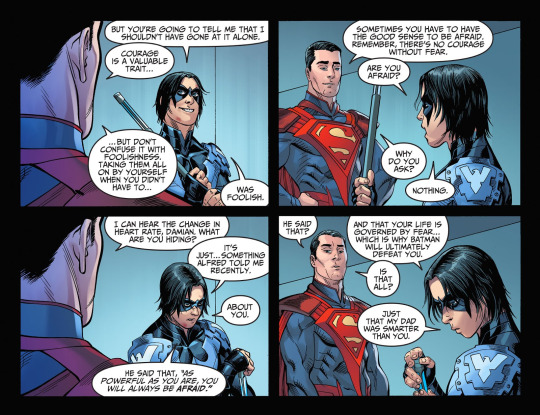
clark is manipulating him into divulging more than he wants to. a boundary damian set is being broken without damian even realizing it. damian’s uneasy. his body language goes from very easy and relaxed to overtly uncomfortable and almost submissive. it’s also very subtle but clark actually rises higher off the ground to intimidate and loom over him.
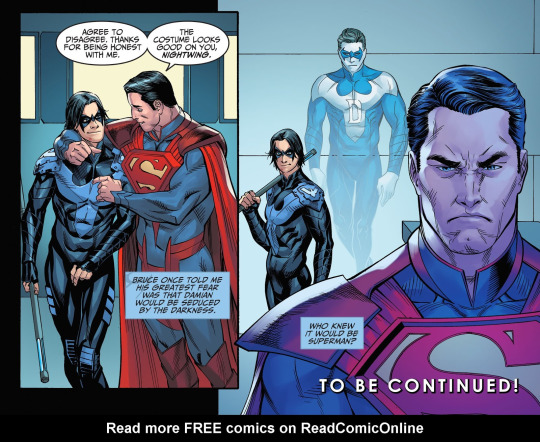
damian, who has only known bruce’s stormy silences in moments of disagreement, doesn’t recognize this for what it is. clark doesn’t take the slight out on him. clark doesn’t stop talking to him because he dared to question.
instead, he loops an arm around damian and praises him, rewards him for being honest and makes it seem like this is an open dialogue and not an interrogation. which it is. i wouldn’t call it gaslighting, but i would call it lovebombing. damian doesn’t realize that there was anything off about the encounter, or if he does, he’ll tell himself he’s just being paranoid.
after all. this ended amicably, not with him standing alone wondering what he did wrong, or being thrown across the room. clark basically stops just shy of ruffling his hair and calling him sport.
he was rewarded for honesty. and so any discomfort he felt was imagined.
i think a thing that a lot of fans miss is that injustice’s damian is a forthright person. he doesn’t lie or deceive much, and later on it will bother him that he’s keeping secrets from kara for ‘the greater good’. he loathes that bruce does it and works hard to not fall into that trap. he wants to be honest. he’s glad when he’s rewarded for that honesty.
because injustice’s damian doesn’t want to be batman. he wants to be superman. he wants to be good.
but injustice’s superman is not a good man.
clark keep secrets, many terrible secrets, and often hurts people and justifies it to himself. he just hides it far better than bruce does. clark is even more controlling and cruel, but he leans harder into his humanity and emotions to hide it. it’s easier to see bruce being cold and calculating and miss the way clark subtly uses what you want to get what he wants out of you. and you never really see it coming when he lashes out. he’ll apologize for it, of course, and if you’re not dead you’ll forgive him, because it’s clark. he didn’t mean it. right?
bruce manipulates overtly and grandly using intimidation, clark manipulates subtly using emotion. damian only recognizes one of these things when they happen.
so clark gives damian what he wants - a parent who loves him, someone he can talk to and even show a little vulnerability with - and then uses that against him.
the worst thing - the very worst thing - is that bruce and clark love damian. he knows this. both seem to genuinely consider him their son. and he knows this.
in injustice vs motu, bruce snaps fully into awareness just as diana snaps damian’s neck. he’s awake just in time to watch his son die. and when clark is brought onto the scene, clark falls to his knees and mourns damian and laments his role in driving him to this.
but they weaponize this parent-child bond he wants against him and each other. frankly, neither of them were very interested in him for who he was. nor for helping him be better and master his anger. damian’s body isn’t even cold before bruce uses it against clark, failing to acknowledge his own part in damian’s all too early demise.
he’s another chess piece on their board. one clark can use to wound bruce. one bruce can use to wound clark.
the person damian is when away from both of their influence is a more complete damian. he’s the very best of both of them.
the damian here is still curt and sometimes rude, but he laughs and bonds with the people around him. he values people’s freedom and seems to strive for honesty and communication. meaning no one is in his war to reclaim the world doesn’t want to be, and he makes no move without everyone knowing.
when he recruits adam, he tells them their story and what they’ve gone through and gives adam the choice to join them or stay in eternia.
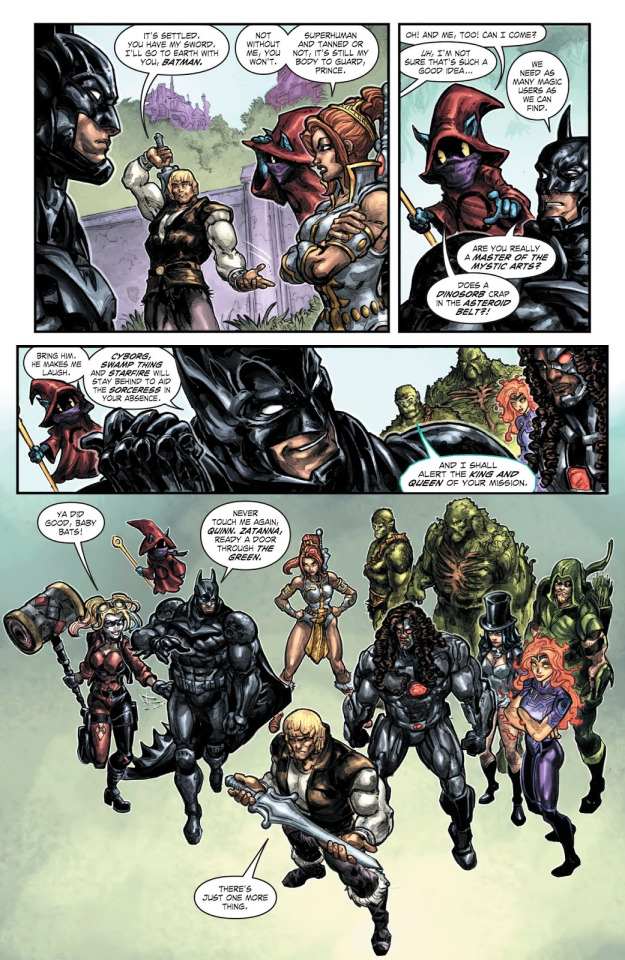
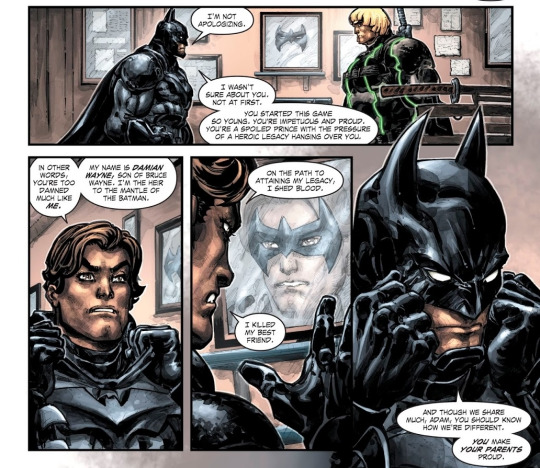
anyway, all of this is to say that even all these years later, i continue to be so sad about injustice damian wayne.
edit:
now, there’s actually one other thing i want to bring up because i totally forgot about it.
so. issue 8 of injustice 2.
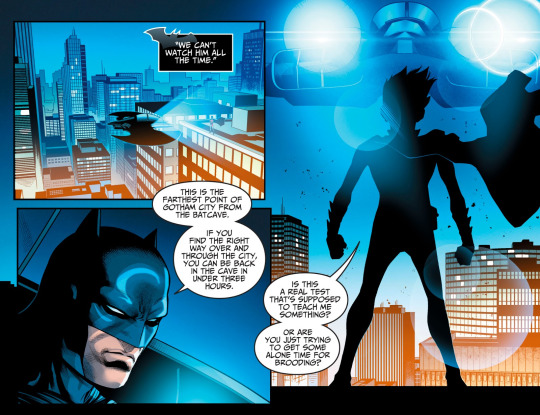
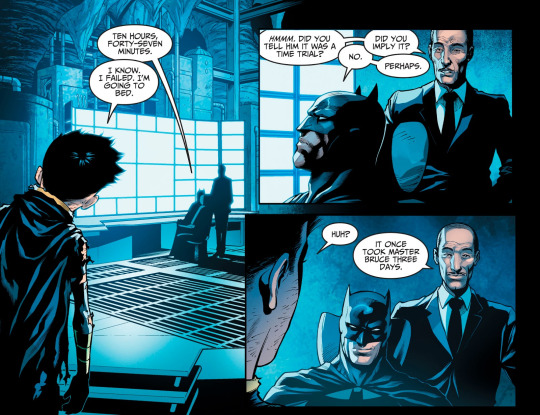
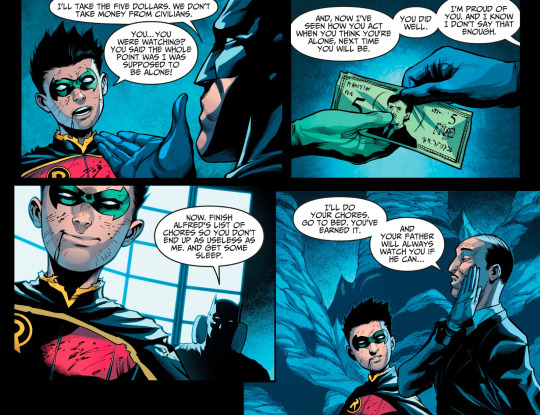
if we’re going with the idea of the reordered robin theory, which is what makes the most sense to me considering jason’s age and the friction between bruce and damian, this before jason dies. and if i’m wrong and the robins don’t have a different order, then this is before some enormous event that broke the slowly building trust.
there’s none of the undercurrent of hostility and distrust that shows up in year 0, which is immediately before year 1. we’re not given a timeframe for when this occurs, either, it’s just happier times.
but what’s really hard to ignore is that the dynamic between bruce and damian is completely different here. maybe tom taylor’s just settled more into writing the two of them, but i don’t think so. year zero comes after this.
he even acknowledges damian’s anger earlier in the chapter. but it’s less of a condemnation of his character and more a concern that he might not be ready to be on his own. alfred is the one advocating for caution, asking if he’s ready, bruce is the one saying yes, he is.
it’s a complete reversal.
and his trust is rewarded with a night of damian abandoning the “”mission”” he was given (get home from the furthest point of gotham in three hours) to help everyone along the way. which was the real goal all along, it was a test to see if damian’s compassion would win out over his want to win. and it does. bruce is proud of him.
so... what happened between them? what caused that shift?
i’m kind of worried we’re never going to know. like, i’m so glad that tom taylor is dc’s new golden boy and they’re just letting him build a million different aus. i buy every book he writes.
but also i’m dying because IJ2 was clearly planned to go on a lot longer than it did and i have questions that i know netherrealm doesn’t care about answering.
27 notes
·
View notes
Text
The Dream smp will have a bad ending (And why preparation beats improvisation)
So. I am back after a little while. And this is a topic that has been on my mind for a long time. But before we get to my main point we have to clear some things.
The medium where a story is told dramatically affects the story in many ways. A story cannot be the same in a book, or a film, or a tv show, or an anime, or a comicbooks. They are all different mediums that have their own positives and negatives when it comes to telling stories. A book can fit more information but a tv show can have music and good camera work, etc.
Now, the Dream Smp is a completely different thing. This is a medium that has (I think) never been used before (Or at least not at this extend). And as all mediums it has its positives and negatives. The positives are very clear, strong and interesting: You can watch multiple POVs, follow the storylines you care about, you can see events from different perspectives and see whoever your favourite streamer is as the main character. And all of these positives are amazing and unique. No other medium has something like it... but it also has negatives no other medium has. As I see the Dream Smp has three big flaws due to it’s medium:
First of all, real life sometimes gets in the way. In books, movies and tv shows you can just pretend life does not exists for the duration of the episode or movie. This is called escapism, the reason why storytelling is so attractive. The problem with the medium of the Dream SMP is that the storyline sometimes is affected by real life in ways other mediums aren’t. For example a streamer deciding not to do roleplay after a big event when we could use a nice view of the after-effects of said event, or a streamer missing an important event that they could have been a major part of. And this is not the streamer’s fault at all. Real life is inevitable. An example is when Wilbur missed the festival because he forgot to read the groupchat. But it is still an unfortunate negative of the medium.
Second, improvisation can be great. But it can also... not. It is a miracle, a truly testament of how good everyone’s improvisation skills are that the story has been so good for a long time (As I have said in prior post, the story is basically flawless until the manberg/pogtopia war. Then it all kind of went downhill). But I think it is starting to show that preparation beats improvisation 9 times out of 10. Improvisation only works when people have a small guideline, something that tells them point A and point B for them to connect. And I don’t think that is happening a lot nowadays. Furthermore, I don’t think the current writer are doing a good job of communicating the plot to other and including everyone. We can see this in many ways: Nicky not knowing about the festival until the day before because of her chat, Dream leaving Techno on read when he asked what the next plotline was, Tommy not reading the scripts, the story becoming more and more the “Tommy and other two people show” instead of the “Dream Smp show”, and many other examples. (I have many thoughts about how I feel like Tommy sometimes is grabbing all the story/clout of the SMP for himself, not on purpose probably, but... I just feel I bad vibe from that. It is not something I can really put into words. Just a feeling. Not accusing him of doing that or being evil or anything. Just an unfortunate side-effect of him being the center of attention all the time which can lead to fatigue from the viewers when the plot is always about one guy and his discs all the time)
And finally the main negative. The biggest problem and challenge the SMP will have. It’s ending: It is not a secret that the SMP is successful, popular and makes a ton of money. So of course they will continue the SMP. But the problem is that the smp has a story and stories can only go so far. For example, Tommy’s discs being a motivation for his character for one or two arcs is understandable. But when the discs are his motivation for several arcs (And counting), it kind hurts your suspension of disbelief (That is the amount of things you can take in a story before you say “This story is not believable at all”). I am not comparing the smp to Disney. But when they continue to stretch the story more than it should because it is successful... yikes. The manberg/pogtopia war could have been the finally if they changed around a couple of things. And I fully understand them wanting to continue the story after that arc (Which I agree was a good idea despite their not so successful attempt of replicating prior arcs). And the point where we are now although kind of weird, I can totally see the story continuing. But there will be a point where it just feels like everything should have ended long ago. You cannot have a character go through the same arcs, the story having the same events all the time. Writing a long story is hard and complicated, you have to justificate why there is more all the time.
And if they don’t start organizing better, including everyone, planning things out, and deciding on a satisfying ending... then the Dream Smp has a will have a boring repeated ending that few people will watch because it will happen when people start moving on from the smp. And I really don’t want that. They should quit when they are ahead, when they feel comfortable ending the story, when all arcs are resolved, before things start going even more downhill.
PS1: Again, english. Sorry if i’m a bit negative on my blog. But there are already thousands of people explaining an analysis all the amazing things from the smp that I would just be repeating what everyone says. Criticising something you love is not a bad thing. I see as your love for something is so big that even with flaws you can still love it... that sounds corny, jesus christs it is just minecraft roleplay. As always, I am never sending hate ever.
PS2: Something irks about Tommy and Tubbo not streaming together almost at all even though in the story they are friends again. That and Tubbo not being on any of Tommy’s videos but other are just... It is probably nothing... probably. Maybe it is just me projecting my own insecurities with my own friends. I am not saying they had a fight or they hate each other now or whatever. But... it’s still a bit sad and weird. Maybe it is because Tommy only wants to do content with like big youtubers and he is focused on always improving and stuff, while Tubbo is more about relaxing and streaming shit he enjoys. A shame. After months of no content from them, they are back but not really.
PS3: Nothing has happened story wise at all since Doomsday. Which is odd. Is Tommy moving on from the smp? He did say he is focusing on youtube at the moment (And unfortunate negative of the medium, real life gets in the way of the story as I said) so maybe it is that. Nothing major has really happened. Not even small things. Why is Tommy streaming less and less all the time? I don’t know. I also do not think there will be an event on the 16th because of the chess tournament and the lack of any plot developments at all since Doomsday. Many questions, few answers. I kinda feel like I am getting a bit tired/moving from the smp. And Tommy specifically, I am glad for him and happy that he is getting all this success but I think his persona made more sense/was more bearable when he was a relatively smaller streamer/youtuber. With the risk of sounding corny again... I feel like Tommy is too mainstream now (Tiktokers are commenting on his instagram posts and that is never a good sign) and has become more corporate (Only streaming and making videos with people who benefit his video’s/streams instead of HIS BEST FRIEND TUBBO. But that really could just be my anxiety talking. Don’t think to hard about it, I am no one to say what he should or should not do, and I do not know of his life to say things definitively. Just a hunch, a bad vibe I am getting from him.).
#dream smp#dream#tommyinnit#tubbo#wilbur#wilbur soot#jschaltt#nihachu#Nicky#fundy#eret#ranboo#philza#QUACKITY#badboyhalo#SapNap#georgenotfound#skeppy#antfrost#technoblade
80 notes
·
View notes
Note
shadow over innsmouth? not even scary, it's just "us versus them" racist ideology but with a fishy port town aesthetic, if you're genuinely scared by that story I think you should do a lot of introspection as to why (not you specifically, but anyone), and I say that as someone who had a strong physical fear reaction while reading the colour out of space, as to say I don't deny Lovecraft wrote well sometimes but the subjects he chose... it's pretty boring actually, and it makes me think less of him that he worst nightmare he could concoct at one time or another was "I have blood from a different race and it's automatically brainwashing me into becoming a savage".
the way he wrote those fish people, they even seemed kinda chill
THIS IS LITERALLY WHAT I THOUGHT WHEN READING SHADOW OVER INNSMOUTH. The racist allegory is palpable everywhere in that story, but what really gets me is that he fails to make them really scary or repugnant; they're just fish people doing fish people things, the reader is supposed to find them scary and repugnant because Lovecraft found fishes and other races/cultures scary and repugnant. For a modern reader who most probably doesn't find either fish or people from other cultures repugnant, there's little to be scared off or to justify the epic and scary chase scenes, in fact, I was left wanting to know more about the underwater civilization and their culture. And the twist that the main character was related to them and destined to become one of them is ridiculous considering it's based on Lovecraft's own reaction to finding he had distant Welsh ancestry I am not making this up
(it's even funnier because the apparent evil consequence to have fish blood is to be inmortal and live forever underwater in a rich fish people kingdom, sounds very cool to me)
I liked many of Lovecraft's work (The Color Out Of Space is a good one, I aslo like The Dunwich Horror, Nyarlathotep, and Haiyore! Nyaruko-san) but one has to keep in mind that when one analyzes Lovecraftian fiction is that is based on fear and for Lovecraft it often wasn't fear of "our little place in the cosmos" or something like that like most of his fans say, but actual, horrible, and boring racism, like in Shadow Over Innsmouth and elsewhere. Sometimes the deeper message is simply "you shouldn't fuck people from other races", and that racism does influence ALL of his work. It isn't THE ONLY thing about his work or about his person, but it cannot be denied is a major one and we have to see it with that perspective.
Most authors were very much racist, or at best exoticist (Orientalism is another whole thing) at the time, but Lovecraft was really, really racist, and it does speak poorly of his work, no matter how compeling it is sometimes. So that's why I enjoy better the shared worldbuilding that evolved from him, and the "post-Lovecraft" takes on monsters as part of us and something that can be loved (Guillermo Del Toro I'm kissing you in the mouth) or more critical new works that actually explore the influence of race in cosmic/eldritch horror (like Lovecraft Country that is on my To Watch list)
8 notes
·
View notes
Text
People break up for reasons besides just infidelity or abuse. Yet, most of the time in the RPC, the only exes that a character ever has seem to be either abusers or cheaters. There’s rarely any middle ground between “absolute true love forever soulmate” and “absolute ex from hell that it’s absurd they ever got with in the first place given how two-dimensionally awful they are”
And, frankly, I think that’s an immature perspective. The reality is that a great many failed relationships are far less dramatic, and there can be many other reasons why a couple doesn’t work out, and many of those are NOT the fault of either party (though perhaps that’s why they don’t appeal to many people, since it means their character wasn’t the victim and the other person wasn’t the villain; I notice a lot of people have a real thing for that)
Here are some non-abusive, non-cheating reasons for a breakup:
- Differing political views. Maybe their differing politics didn’t matter to them when they first got together, but a few years down the road, it became a bigger issue, especially if something very politically divisive started going on in the country. Or perhaps they didn’t differ politically at first, but one or both of them changed their views later on. This can also apply to religion or any other strong belief (veganism, feminism, even following a certain band if they make a lifestyle out of it) People can certainly believe very different things and still be in love, but our political, religious, etc beliefs do permeate our everyday life very strongly---what media we consume (or refuse to consume), what religious centers we attend or holidays we observe, what crowds we hang out with---and it can make a lot of relationship hurdles come up that many people aren’t prepared to deal with.
- They got together without intending for it to be something lifelong, but then one person wanted it to be, and the other person still didn’t, so they broke it off then. The person who caught feelings isn’t in the wrong, they couldn’t help that, nor is the person who DIDN’T in the wrong either. They probably both made the healthiest choice in that scenario by splitting.
- Wanting to live different places, wanting different lifestyles, etc. John and Burt work well as a couple, but now that they’re getting serious, they have a discussion about what they each really want, and John wants to raise a family in the city, while Burt wants to travel the wilderness in a camper with just the two of them and maybe a dog. They might try to compromise, but these ideals are so far from each other that they decide it’s for the best to split up now before things get any more serious and one of them has to sacrifice his dreams.
- Somebody moves for whatever reason (for a job, to take care of ailing family, etc) and the other person can’t or won’t come, and they grow apart. Sometimes long distance relationships work, sometimes they don’t. It has nothing to do with how “truly in love” the pair are or how good/faithful/devoted/etc someone is. Sometimes it just doesn’t work.
- One or both of them changed. Maybe Susan and Jim were great together for awhile when they were BOTH stoner college kids, but now Susan has gotten serious, has a steady job, etc., while Jim is still a stoner college kid without the college.
- One person is mentally ill and the other person cannot support them as well as they thought they could. Again, this does not make anyone bad or evil. It doesn’t mean that the other person didn’t love them enough, it’s just one of those shitty things that’s not anyone’s fault. Similarly, one person goes through some huge emotional upheaval and the other person can’t handle it. Which, okay, bailing on someone in their time of need IS shitty, but in a different way than the “abusive and/or cheater” cliche. Also, an emotional upheaval can dramatically change someone’s personality, often for the worse, and it can be more than the other person ever thought they were signing up for.
- Incompatible sexuality. I don’t just mean that somebody came out of the closet (though that can be an option as well) but as in what each person wants in the bedroom is very different. Compromise is a part of any relationship, of course, including in bed (or wherever you’re doing it) but as with John and Burt, if you’re just so different that one person won’t be enjoying themselves no matter what you do, it’s sometimes healthier to call it quits.
- One person realizes they’re polyamorous, the other isn’t. Again, no bad guys here. The polyamorous person is not a slut who threw away true love to chase strange tail, the monogamous person is not a close-minded stick in the mud who should have forced themselves to do something they’re not comfortable with. They’re two people with different needs who may have been otherwise compatible, but must go their separate ways on this.
- Cultural differences. What wasn’t a big deal while dating might become a very big deal when it comes to becoming a part of someone’s family.
- One of them had emotional/trust issues and always split when things were at their best, so they could never be disappointed.
- One of them had emotional/trust issues and always split before they got too close to someone
- One of them had emotional/trust issues and always split. . .you get the idea. Basically, think of any muse you’ve ever written as or with, and why they would split without the other person being to blame, and that can be why this muse’s ex did.
- Beginning to feel like a mother rather than a girlfriend. I left the others gender-neutral, but from what I’ve found, this seems to happen mainly to women in m/f relationships. The guy seems great in all other regards, dating goes well, etc., but once they’re living together, it seems like he depends on her to clean up after him, do his laundry for him, manage all the bills and taxes and other paperwork, etc. There can be a multitude of reasons for this, but if he won’t change, the lady isn’t in the wrong to leave. And, okay, this one is definitely someone’s fault (his) but it’s still different than being an abuser or a cheater.
- Addiction. It can happen to the best people, and it destroys them. A person is not bad to put their own well-being first if their addicted partner won’t---or can’t---change.
- One person was just a real slob. Look, I had a roommate once who was great in almost every other way, but our condo was a fucking biohazard because of her. And she had good reasons---she struggled with mental illness, as do I---but I now know that’s a big fat dealbreaker for me, and I’m sure it is for a lot of people.
- They went through something dramatic together, like an abortion, and just couldn’t soldier through together after. Not all relationships are as strong as the people involved think, and they aren’t bad, shallow, or stupid for it.
So, if you need or want for your character to have exes in the past, these are all some good reasons for a “no-fault” breakup! Or some fault, in some cases, but still non-cliche.
#writeblr#writing#writing tip#writing tips#oc tips#character tips#backstory#character backstory#backstory tips
46 notes
·
View notes
Text
A host’s perspective on Molly, Lucien, and approaching identity (spoilers for c2e117)
This is NOT going to be as eloquent as I want it to be and I can only speak for myself and my own opinions, but this is for @creativside and anyone else who wants to hear this particular perspective. Again, I’m speaking only for myself, not for every single system, especially not for Molly or Lucien fictives. I’m also referring only to DID systems here but OSDD systems, I see you.
I don’t really advertise it on this blog (or anywhere), but I’m the host of a DID system. My relationship with the system is not quite the same as other systems we’ve gotten to talk to but nevertheless communication has greatly improved since our diagnosis and I dare say that I feel “valid” enough to try to sludge through how I’m feeling about the whole situation with Molly/Lucien. Put under a cut b/c it’s long
For anyone who might not understand the connection I’m trying to draw: a situation where there is one body that has been inhabited by two different consciousnesses who are not otherwise aware of each other and who have different personalities, abilities, and ambitions is a situation that directly parallels the textbook DID experience. Having people call you by a different name, talk about things you supposedly did with them but have no recollection of, and having people ask or expect that they will be able to talk to this other person in your body whenever they want are all things that pretty much every system goes through. I’m not saying that Lucien has DID, but there are a lot of identical and/or incredibly similar terms and concepts being thrown around regarding him, so for the sake of this thinkpiece I’m essentially going to be acting like he does.
I’m going to make some bullet points and just try to give my two cents on how everyone is approaching this situation:
Molly was a real person, just as much as Lucien. This was discussed by some of the characters, but I’m just validating it. Lucien called Molly a “fragment” of himself-- fragment is a term systems use to describe a certain “type” of alter. DID fragments are alters who typically aren’t as “developed” as some of the others in the system, meaning that they may only exist to feel a particular emotion, store a certain memory, or carry out one very specific function. In my experience, fragments do have names just like any other system member, but likely don’t have much distinguishing personality beyond that. From what we know about Molly when he first “woke up”, calling him a fragment would be accurate. He was, originally, a consciousness who only knew a singular feeling-- emptiness. That’s all he was. But he was still his own consciousness, his own unique person, and as we all saw, he was able to grow beyond his emptiness and develop into a fully realized creation (to borrow a term). His being a fragment wouldn’t have invalidated him as being his own separate person in the first place, but the Molly we knew was no longer a fragment; he was just... a person! By the time we parted ways with him, he was just as complex and unique of an identity as Lucien is. He is not as simple as Lucien is making him out to be, we know this.
Lucien implied that Molly integrated into him and is not dormant. What do these terms mean?
Dormancy (or becoming dormant) is experienced a little bit differently for each system, but generally an alter becoming dormant means they no longer appear in the headspace/inner world, cannot communicate or interact with any system members, and will not be able to front/switch out (take control of the body). In our system, becoming dormant is equivalent to becoming comatose. Due to the way our inner world is constructed, we do know where the “body” of our dormant alter is, but we cannot interact with her in any way, nor does she interact with us or appear anywhere else in the headspace.
Integration, on the other hand, is better explained in the context of fusion from Steven Universe. A few years ago, I (the current host) integrated with our gatekeeper & primary protector (basically the one who managed the functioning of the system). Where once we were two separate consciousnesses who inhabited the same headspace, we are now joined together into someone who is a little bit of both of us, just like when two gems fuse in SU. I also happen to be the core (the consciousness who was in the body when we were born), so it could be seen as her simply “returning” to me, or fusing back with me after having broken off during her formation. Complete system integration is the end goal of some therapies, but there are some alters who view integration to be the same as dying, since the alter as a singular unique consciousness no longer exists but is instead “merged” into the consciousness of another system member.
Lucien said something along the lines of his soul having been fragmented but now fused back together. He appears to believe that he is the only consciousness currently in his body. This means that Molly is not “trapped” inside somewhere waiting to be set free. It also implies that it would not be possible to “get Molly back” as we remember him without finding a way to fracture Lucien’s soul again. Depending on your view of integration, you can view this two ways:
Molly is Lucien, and/or Molly is dead. Matt’s slips of the tongue in continuously calling him Mollymauk further supports the idea that Molly is integrated, not dormant, and therefore is Lucien in one way or another. Molly was, after all, a part of Lucien all along, and despite having developed into his own personality in the wild 2 years he was fronting for, all that he was are now part of what Lucien is. That being said, it is clear that Lucien, just like Mollymauk, is his own person with his own goals, quirks, abilities, and personality traits. Aspects of Mollymauk do live in him, but being fused does not mean that we’re going to recognize all parts of who Molly was in who Lucien is now. Lucien (we’re assuming) is the core, the original consciousness of the body, and is thus far more developed than Molly ever had the chance to be. They’re the same person in the sense that Molly is no longer a separate entity, but not the same person in that Lucien has any of Molly’s memories or would suddenly feel compelled to start acting more like him just because they integrated.
Mollymauk is not back; Lucien is. The Mollymauk we knew is not there anymore, and it’s a good time to mourn him. I don’t know what kind of DND fuckery Matt or the cast might be able to do, but from my perspective of what’s going on, Molly isn’t going to suddenly pop out or break free or anything like that. Mollymauk as an individual died when we saw him die, and I think the Mighty Nein are at least starting to realize that. Lucien even genuinely offered his condolences. Again, it’s DND, there’s always some chance that they might find a way to talk to their friend again, but by this point the idea is making me uncomfortable. Trying to separate Molly from Lucien again at this point feels... unnatural and disrespectful. No one has ever sought to de-integrate the alter that I integrated with, but I would be very disturbed if they did, and the idea of doing that even in this context unsettles me. Find hope in the possibility if you want to, but I’m probably never going to support it. Molly is a part of Lucien now and I think both we and the Nein need to accept that. Lucien may be evil, but he has just as much right to be in control of his own body as Molly did (arguably more, but I’m not getting into that debate). Whether you like Lucien or not, it’s his body, now only his, and no one has any right to take that away from him.
I know it’s not exactly the same and it’s probably not how people mean to come off, but I can’t help imagining me in this position. If someone was very close with the alter I integrated with and did everything in their power to try to make her split off again, even if it meant harming me or making me lose autonomy over my mind & body... you can see how that’s a very uncomfortable thought, at the least. Again, I’m not saying anyone is inherently bad for wanting Molly back or missing him, I’m just saying that the situation we’re being presented with is that it’s only Lucien now and we & the m9 should respect that. If you want to mourn Molly, now’s as good a time as any. You even have Lucien’s blessing. That being said...
Lucien doesn’t want to know about Molly, and that’s fine. As someone pointed out (I think Jester?), Molly didn’t want to know about Lucien either. As is the case with a lot of systems who don’t have well-developed communication, they’re practically strangers to each other. All they knew about each other is what was on their body when they woke up and what other people (also strangers) told them they supposedly did once. Again, parts of Molly exist in Lucien, and I’m sure aspects of Lucien existed in Molly, and even now there are some similarities to draw. But neither Lucien nor Molly have any obligation to feel kinship towards each other. In their eyes, they are two completely different people who have never interacted. Systems only start to feel like families after a long time of having good communication, of developing relationships, of working through trauma or the complications that come with having DID. From what we’ve been told, Molly and Lucien likely never even developed a headspace or been in a situation where they would’ve had the possibility of actually meeting. People are just talking to them about someone they didn’t know and honestly the typical response is to just nod along in the moment and decide if you really want to unpack that later. And not wanting to explore who this stranger who inhabited your body was is a completely valid response! Especially given that Lucien doesn’t explicitly have DID-- he doesn’t have the goal of trauma recovery, nor does he have any reason to find out more about who Molly was given that he’s now supposedly fully integrated.
Again, it’s more a matter of autonomy. Lucien is his own person, and to him Molly might as well have been something he called himself when he spent 2 years blackout drunk (which, let’s be real, is a pretty accurate comparison). Sometimes it’s fun to hear accounts of what other system members got up to when they fronted, but that’s only after years of therapy and working through my own feelings about having DID. Before that, there were times when it felt like a frustrating invasion of privacy, or an unnerving sense of losing control of not only what I did, but what it meant to be me. I don’t really see Lucien struggling with these things, but I’m just saying that there’s only so much he can be expected to care about who Molly was given his circumstances.
This got super long and I’m never sure how to conclude these things, or if that’s even all my thoughts on the matter. Send me asks if you want to I guess, just please be respectful. I���m not trying to start any arguments, I’m just giving my perspective/how I feel about this situation as a system host.
tldr; Molly integrated with Lucien and it’s more respectful/probable to assume that he’s not coming back the way people wanted him to. Getting Molly back the way people expected is incredibly unsettling to me because it takes away Lucien’s autonomy and basically says that Molly is more important than Lucien’s control over his own body because we like Molly more. Their situation does resemble the experience of being part of a system in a lot of ways and I don’t know how to feel about it besides just kind of awkwardly going “ahaha” and looking around to see how singlets are approaching this.
Again, not saying there’s a right or wrong way to feel about this, nor am I “diagnosing” Lucien with DID. Just talking about connections I’ve made and the things that I relate to/make me uncomfortable. Whether Matt is aware of how much this situation resembles DID or not, I think that he’s handling it incredibly well and have no complaints about Lucien or Molly’s characterizations.
#cr spoilers#did#dissociative identity disorder#mollymauk tealeaf#lucien#the nonagon#cr c2e117#c2e117#spoilers#not sure how this post is gonna go over but here it is
42 notes
·
View notes
Text
essay/analyzing/theory time folks
probably taking this a bit seriously but i find theorizing and doing these types of things fun, so here we go.
also i know it really isn’t that deep but let a girl hope.
here’s the thing. i absolutely adore the idea of traitor tommy: the angst, plot, shock, excitement, everything. i know techno and wilbur were already deemed the traitors but i think tommy might have a chance? also techno didn’t really betray them, but that’s for another day. but, since i have nothing else to do right now, here are my theories on why/how traitor tommy could/might possibly happen
btw spoilers i guess as of nov. 22 streams
Few things that can completely overturn the traitor tommy thing
i know the traitor tommy thing might never happen, solely for the reason that tommy is considered as the protagonist, or main character, at least from the viewers’ perspective.
tubbo. tubbo is the only person tommy truly trusts. tommy won’t betray tubbo under any circumstance and can become very a little worried when tubbo’s harmed/in danger/killed. tommy was willing to blow up l’manburg after tubbo was killed, despite his obvious distaste of the notion. tommy’s loyalty literally may never shift.
tubbo also has melohi, another disc of tommy’s. tommy gave it for trust in the fact that he will never betray tubbo, so that might be true.
also, i’m spewing out ideas as i go along, and then again, anything can happen here on out.
anyways, here are the theories/reasons.
Tommy still wants his discs back.
now, a few things to go over
as far as we know, skeppy/dream have the last (?) of tommy’s discs . Now the thing is, there are only a few things that can occur so tommy can get his discs back:
it’s just that easy and tommy can ask - that’s not happening
he never gets his disc back - this could drive the next story arc but kind of unlikely? the disc war initiated pretty much a lot of things i think
duel - that won’t go well
war - very possible
spy - information for dream? badlands (for some reason, though unlikely)?
traitor/betrayal for the next war
Now all those listed above, can or cannot happen based on how the next few weeks will go, however, we are focusing on traitor tommy.
tommy could make a deal with Dream for the discs, depending on how desperate tommy is. tommy’s discs are the last thing he needs before he can be at peace. it’s the most important thing to him and was what basically started everything. betraying l’manburg could be one of the most interesting and best things he can do so he can get his discs once and for all.
apparently, the disc is planned to be burned soon on a stream, so in an act of desperation or impulse, deals could be made for the disc.
Chaos (by extension of the discs)
in return for saving the disc, war could be declared upon l’manburg because... well... chaos. dream strives for chaos and tommy’s betrayal will invoke that in the best way. if tommy ever is that desperate, he’s putting his reputation, trust, and allies on the line. He’ll be alone but have his discs, so will that truly put him at peace?
he’s losing the trust of tubbo, his best friend, unless tommy and tubbo decide to betray together
after all, whatever tubbo does, tommy is likely to follow.
Power
“Tommy, when I said you’re never gonna be president, you’ve got to understand, that wasn’t-, that wasn’t a challenge. That’s true. You’re never gonna be president, Tommy.”
Spiting Wilbur could be a possible reason for betrayal, but then again wilbur is dead and that will put him against tubbo, in which tommy’s loyalty is too strong for that. unless he had a change in ideals for some reason.
the thing is, tommy gave up the title of president just for his discs , so that brings up the question, what will he do after he gets the discs?
if the discs were something so important, would tommy want to get back to the title he was offered before giving it away for those discs?
i honestly don’t know, but before the war, power was a very strong reason for why tommy could have been the traitor, as well as protecting l’manburg.
the concept of power seems to be fairly important to tommy. wilbur only gave tommy presidency just to take it away to a degree, to break his heart, which wilbur would know how to do since they’ve been through pretty much everything together (plus they’re canonically brothers).
even further, techno said it himself.
when tommy and wilbur were exiled, the first thing they realized was that they didn’t have any power over the country they built. wilbur realized this, hence why he spiraled into madness. tommy, however, he was nailed in on the fact that they could have won, that they had to take back l’manburg because schlatt was tyrannical.
techno was right, schlatt won fair and square, yet pogtopia still did a coup and became what they believed they were fighting against. tyranny. government.
schlatt
just a reminder, tommy’s idol used to be schlatt. as far as i know, quackity is planning on resurrecting schlatt to be able to rule l’manburg, meaning overthrowing tubbo.
so, that begs the question, did tommy’s previous adoration of schlatt ever change?
i mean, he did kinda hesitate to put an arrow between his eyes when wilbur told him to, and that was before wilbur said to wait. maybe a stretch
Corrupt Tubbo
tubbo hasn’t done anything except rebuild l’manburg, but imagine this. he used to be a part of schlatt’s cabinet. he has no real experience as a president and like, he’s young. but anyways, tubbo wouldn’t know much about running a country, so the only place he can get some type of information of this would be from working with schlatt and implement it in his administration. lowkey down for that
under the circumstance in which tubbo becomes a corrupt president, tommy would be conflicted towards tubbo being his best friend and tubbo being the tyrannical leader that every. single. president. had become.
wilbur was a good president but limited the members of l’manburg, built walls, etc. schlatt was, well, schlatt. he was a bit mean to his citizens and cabinet, was a literal dictator, exiled one of the parties, and was just... evil vibes. the only ”good” thing is that he was elected properly.
anyways, realizing how similar tubbo’s administration could be to schlatt, tommy could, again, betray l’manburg/tubbo in order to bring him back to his senses or on the more evil side, overthrow him?
Just out of spite
maybe he gets tired of being called a child. making a deal of some sort and betraying the nation could do that in some weird way. even though ghostbur doesn’t remember it that much, his presence can be enough to remind tommy that he is always seen as the immature child of the group despite his desperate retorts explaining that he’s not.
by betraying l’manburg, he might think that people will think of him differently? as someone who went to the “dark side” in a desperate attempt to be seen or listened to like technoblade. he won’t be called a child if the strongest person on the SMP is behind him.
i mean, tommy has matured, compared to him during the revolution. he seems to think more about what he should do, he tries to be a leader, taking weaknesses, strengths, circumstances, etc. into consideration for example, as he does in MCC.
i can understand how frustrating it is to be called a child and too much stress can just make someone snap. he makes the deal and he’s not going to be called a child anymore.
it’s unlikely but it’s a fun little mini-reason
tubbo
if tubbo becomes a traitor, tommy most likely will follow. that’s it.
chaotic good
tommyinnit is “chaotic good” according to wilbur.
however, wilbur’s reasoning for this seems to be a bit interesting.
While Tommy may seem lawful on the surface (due to his keen understanding of the codes and conventions that he must follow) he still flips his values radically based on tiny non-emotional changes in his environment.
again, tommy’s values can change the minute something changes in his environment. for example, tubbo being murdered by techno.
the second tubbo got killed, tommy was willing to blow l’manburg to smithereens
so you don’t know what could happen since tommy’s ideals can change within a second
despite everything, i’m only holding on to hope when it comes to some sort of tommy/tubbo corruption arc. it’s possible, but not 100%. honestly, any kind of betrayal i’m down for but it’ll take a bit to regroup and recollect.
im genuinely just a sucker for a main character turned bad guy kinda deal. reminds me of the end of “murders” by miracle musical. like, after the main character did everything they needed to, they’re alone. they defeated the bad guy, they thought they saved the city/town/community, but just pan out. look at the destruction around the main character. as a viewer, you were only encapsulated in the main character’s perspective because they’re the main character, but look around. see that everyone despises them. they don’t see them as the protagonist the viewer thought they were.
#traitor tommyinnit#traitor tommy#dream smp theory#dream smp#l'manburg#sleepy boys inc#sbi#sleepy bois inc#pogtopia#dream smp war#wilbur soot#tubbo#jschlatt#dream smp spoilers
36 notes
·
View notes
Text
“Fifty years ago, I concluded that the best thing for the planet would be a peaceful phase-out of human existence.”
With these words, Les Knight justifies the Voluntary Human Extinction Movement in an article for The Guardian. Rather than write out the whole piece, I’d invite anyone reading this to read Les’s article before going on (it is quite short).
If you cannot be bothered to read it, my brief summary would be this: the earth would be better off without humanity, which has caused all these problems, so we should work towards the extinction of humanity.
In a singular term, the ideology being pushed here is what I’d call political misanthropy. It is political in the sense that it relates to decisions being collectively made regarding the affairs of the city. It is misanthropy in the sense that the perspective views humans as at the very least “bad”, though probably more like “evil”.
Now, while I am an eco-anarchist writer writing within anti-civilisation discourse, despite what you might assume, I am not a misanthrope. I’ll give you a moment to let that sink in … yes, I desire the ending of this 10,000-year-old failed cultural experiment and a total rewilding of earth. But I do not feel hatred for humanity and I do not share in the misanthropic perspective that there is something evil about humanity.
What I call myself is an anti-humanist. Yeah, sounds like it is the same thing, doesn’t it! But anti-humanism has an extremely different perspective and reasoning to misanthropy.
As an anti-humanist, my perspective has two threads to it, which twist around each other to form a single strand.
The first of these draws from post-structuralist psychological and sociological studies; the second comes from my experience of the world as an egoist who rejects species-being.
Basically, I do not believe in the existence of humanity. Or rather, I believe in humanity in the same way that I believe in juggalos, hipsters, cybergoths, steampunks and hippies – it is a stereotype.
Yes, there is a biological basis for this stereotype of habitual similarities, but really every “human” is uniquely them, in the sense that everything is different. Not believing in humanity can be a weird thing to tell someone – especially if they identify as a human! It can become an even stranger conversation when you compare people who are proud to be human (humanists) are using the same type of identity thought as that of people who are proud to be white, and point out how similar speciesism is to racism.
Returning to Les, if he means the extinction of a stereotype, which I call dehumanisation/becoming-animal (and he almost certainly is not), then I can embrace this call for extinction. However, if Les means attempting to remove unique living animals that are included within this stereotype (which he no doubt does mean), then I feel rejectful of this attempt. Les, as a misanthrope, is a humanist, who seemingly privileges humans in the great chain of being, in the same way that Satanists are Christians, who raise God up to be an almighty evil.
If we move past the question of “what the fuck is a human?” and just work with the stereotype, then what is the cause of all this?
I assume that we are including uncontacted tribes, such as the Sentinelese, the Batek or the Yuqui and indigenous communities who were colonised by European settlers in the last few centuries, as humans (if not, we’re surely being racist)! Are they the cause of all this? If not, are they evil, or is guilt by association enough to condemn these peoples to their end? My intuition and instinct is that you (even if that you is Les himself) will also find the idea of their extinction being necessary ridiculous at best and vile at worst.
Like many others who have similar to perspectives to mine, I am of the opinion that our present situation is mostly due to technological development – advanced technologies, industrial technologies and (yes) agricultural-architectural technologies. And like the horses who pulled ploughs for centuries (and still do in many places), humans seem more like the fuel this now global totalitarian culture/machine uses to sustain itself with. The response this often gets is that technology serves human needs and ends, but I believe that closer inspection reveals that technological development and humans serve technological needs and ends.
If there is one thing that “voluntary human extinction” is, or is intended to be, it is a solution.
There is (apparently) a problem (humanity), so there is a solution – this is what we were all taught in math class as kids. The ideology of solutionism (people who believe in the existence of solutions) stems from political optimism.
As a pessimist, I am extremely mistrusting and rejecting of optimism. Pessimism doesn’t mean sad, miserable, or defeated – which tends to be the experience of optimists who didn’t get what they thought they would do from their solutions. Pessimism is the assertion that the “human” will ultimately collapse into the inhuman/unhuman, rendering all the solutions of humanity futile (including humanity’s extinction as a solution) – we all die eventually and always will, and every “improvement” has not been worth the cost, when the payment is due and it is mass extinction, mass poverty across the world, lives typified by mass boredom and everything else that makes up normal everyday Reality of this culture.
Arriving at one of the solutions that Les suggests – martyrdom through vasectomy – I have a disgust reaction. On a personally embodied level, I do not want to abuse my body out of self-sacrifice. As an egoist, my motivations are desire based, rather than moral based, and the only reasons conceivable to me for my having a vasectomy seem like moral ones.
Basing arguments in moral logic seem to me to have been one of the greatest continual weaknesses of environmental thought, as it stinks of self-sacrifice and is highly off putting. I favour the approach that one of my literary loves, Daniel Quinn, suggests, in encouraging people to seek what they want/desire, what they really want/desire. Really, people don’t want mass extinction and most people (misanthropes are people too) don’t want the extinction of the living animals who make up the stereotype of “human”. The extinction solution is so off-putting, it seems to only succeed in making environmental discourse appear more like bullshit self-sacrifice, than something that is actually desirable.
Relating to people on desire-based levels is terrible, because we aren’t discussing what is right or wrong and we are not forming solutions to problems. We’re entering into a space that is dark, animal, confusing, conflictual and so inhuman that churches have put in centuries upon centuries of effort to ensure that people weren’t relating on desire based levels.
In the last mass extinction event, were the survivors the individuals who did not breed? What about the one before? What about the one before that? Any of them?
Surely a mass extinction event is more of a reason to have children?! Not to raise them to be horrible little conformist consumers, who make this Reality more revolting. If “human” is a stereotype, as an environmentalist, I encourage you to dehumanise yourself and your life and to raise little inhuman/unhuman/abhuman children, who will grow up in the nightmare that this Reality has built, but are capable of surviving it and supporting those other non-human living beings (including biologically stereotypical humans who are not humans) out of an egoist desire for their presence.
Extinction might hold a (comfortable and disgusting) promise, but promises rarely amount to much. Dehumanising the world by raising unhuman/inhuman/posthuman children, in a landscape full of ruins, in the midst of ecological collapse, to face whatever world comes after this – it is awful to imagine and far less certain a route. However terrible it might be though, I am thoroughly in favour of life!
Julian Langer
47 notes
·
View notes
Text
..In attempting to answer asks, I have had a thought. It’s almost two o’clock in the morning, so it’s not a particularly coherent thought, but it’s a thought nonetheless. Possibly multiple, in fact.
It also, in typical me fashion, ended up being comprised of a lot of rambling, so it’s gone under the readmore.
TLDR: trying to sort out the problem of Pavo being invisible, plus my attempts to explain how bits of DQIX work for those who don’t know the game
DQIX establishes that Celestrians (who are essentially your stereotypical “guardian angels”) cannot be seen by living humans - only by monsters, animals, and ghosts who have yet to pass on. However, it specifically seems to be their halos that give them this property, since when Corvus is recovering from his injuries in Wormwood Creek, he still has his wings and most of his powers (unlike the player, who loses pretty much everything Celestrian about them other than the ability to see ghosts), but is very much visible to the people of the town despite that. The only thing that’s not there is his halo (it’s there in the scene where Serena first finds him, but not in any of the ones after that, so it being there for that very first moment was probably an oversight).
Now, Pavo and Ardea are both Celestrians, but Ardea lost her wings and halo in the process of falling through the sky down to the world below after the Observatory was attacked. In the game, Pavo always resides in the Quester’s Rest, where she opens the Rapportal from - but, in my version of events (because canon can be whatever I make of it), she joins Ardea on an adventure across the Protectorate instead, in order to locate Aquila. There is perhaps a slightly-obvious problem in this, namely that - as a Celestrian - nobody other than Ardea would actually be able to see Pavo unless she had also lost her halo.
..The first solution that came to mind for how to somehow get Pavo to lose her halo is that her halo is the Rapportal. I think that might be a bit too silly though. My other thought is that Pavo loses her halo, or at least its ability to keep her hidden from mortal perception, because she has spent so long down in the Protectorate without returning to the Observatory, so it’s like her proper full powers and Celestrian aspects have waned or something?
Though, to my knowledge, it’s never actually made clear why Pavo remains in the Protectorate from a story perspective (the actual reason is just “so that you can always access multiplayer”), so.. it could even be that she’s a “fallen” Celestrian for some reason, just in a much lesser capacity than your typical evil fallen angel. She does talk about being the only one of the Celestrians to “dare to defy fate” or something by opening the Rapportal; maybe that act is why she is deemed as being “fallen”, therefore losing her halo (or at least some of its powers) and being rendered visible to mortals, and why she never returns or ascends to become a star.
(I’m also still not 100% sure whether I do actually want Ardea to lose her wings, because hello having wings is very very cool and would also suit the fact that she’s supposed to have very high agility. However, from a reasonable perspective of blending in with humans, it would definitely make more sense for her to lose them, especially since - unlike with Pavo, whose wings are viewed by mortals as a cape thanks to her own magic - Ardea can’t actually cast spells due to losing some of her powers.)
Anyway, I’m very tired and I spent a lot longer writing this out than I should have. ..I didn’t really end up getting to a particular point with it, either, but maybe if anyone figured out what I was trying to say (’cause I sure can’t .w.) then they’re welcome to comment on what they think.
Thank you to anyone who’s read all this, though, and hopefully it makes at least some semblance of sense!
#a call from the void#selfship#selfshipping#love: winged watcher (pavo)#I *really* wish I could come up with a good tag for her but nothing is coming to mind and I hate that that's the case#especially since the tag for the selfship is - if I do say so myself - amazing#selfship: a celestial rapport (pavo/ardea)#self‑inserts#self‑insert: clawed heron (ardea)#mmm that tag is a bit clunky I will probably try and change it soon#i'm just still not 100% established about how I want ardea to be#this took like a solid hour to write out wow. I should really get some sleep.#and hope to anything that I can actually get through some of the stuff in the inbox for once..#i'm so sorry I haven't answered stuff for a while
9 notes
·
View notes
Note
Do you think that if Shredder!Raph will occur in rottmnt, the aftermath might result in Raph inheriting some of Shredder’s rage even after saved? Maybe that is how the crew is going to implement Raph’s trademark temper throughout previous generations and maybe even make him have to step down due to it, making Leo the new leader?
Short answer: “Inheriting the rage of a centuries-old demon" is a dope-ass idea, so if you’re a writer I would definitely encourage you to use that in your own stuff. But I think that if Raph’s temper worsens throughout the show, it should be because of his own character development and not a magical effect. However, a Shredder!Raph scenario could contribute to said worsening temper by inflicting emotional/psychological damage instead. :)
Long answer ahoy!
Looking at “Many Unhappy Returns” from the Shredder’s perspective makes it very clear why he does what he does. Like, he’s been dead for five hundred years, and then something went wrong with his resurrection. He’s waking up with no idea where he is or what’s going on and oh shit those guys are pointing weapons at him, that’s a threat!
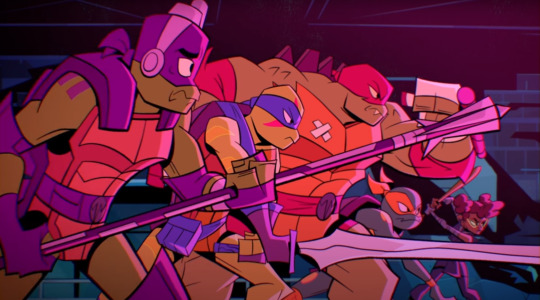
Note that he doesn’t even bolt for them immediately, he does a warning stomp and screech (back off!) before starting to approach.
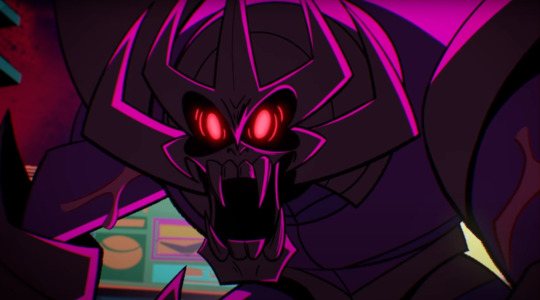
Those other guys are yelling, that’s also a threat,
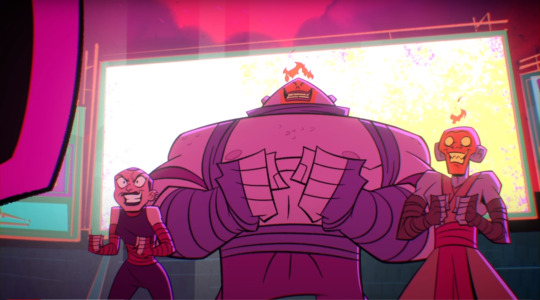
and they’re closer so he’s gonna attack them first, actually. (None of the Foot wind up even comically injured, suggesting that flailing them around was an intimidation tactic rather than genuine Murderous Intent.)
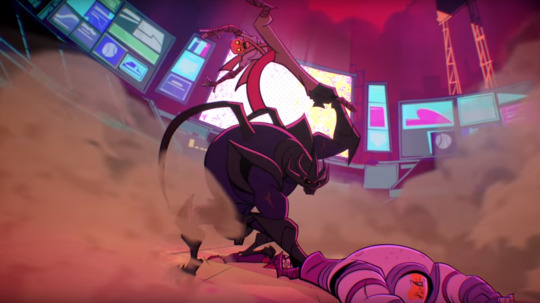
And then the first group attacks, so of course he’s going to retaliate.
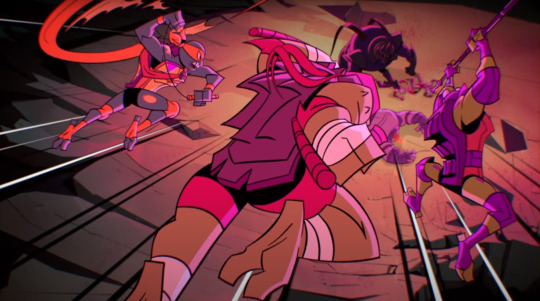
And then suddenly he’s somewhere else, with other threats (the animatronics), and then the first group that attacked him is back, so he’s gonna fight them again.
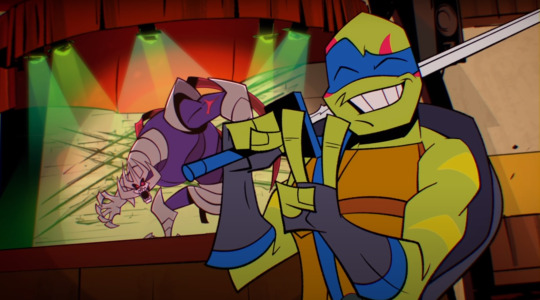
And these jerks just keep following him? He’s not going to ignore that. And WOW that’s a lot of bright lights and loud noises, which are also threats, what the fuck is going on?!
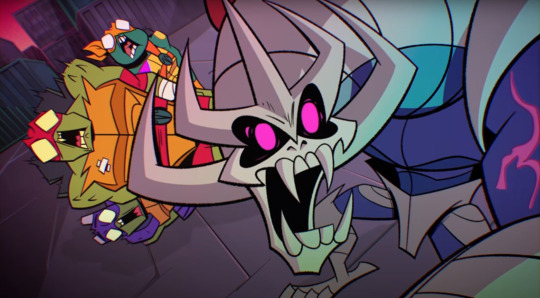
And then this tiny human girl chucks a giant metal box at him, holy SHIT?! Sure, the Shredder is a dangerous antagonist, but at this point I wouldn’t call him a “bad guy”, he’s literally just responding to what’s happening to him.
In summary, the Shredder was stressed tf out because he didn’t know where he was or what was happening, he retaliated against perceived threats, and quite possibly wouldn’t have attacked the turtles in the first place if they hadn’t just rushed in without understanding the situation.
Gosh, doesn’t that sound familiar?
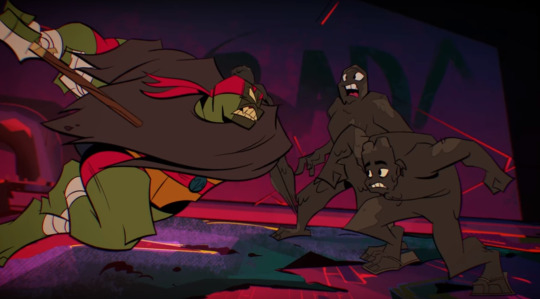
So yeah, I’m waiting for Rise to give us that good good Shredder!Raph content.
As for the possibility of Leo taking over afterwards... no, but also yes, sort of? On the one hand, we know that Leo does have leadership capabilities, and it would be a waste for the narrative to not explore that. On the other hand, Rise has broken from the status quo in many ways, and it would also be a waste for the show to do a complete 180 and return to Leo Being The Leader™.
Consider how the “leader” role has influenced Leo in past iterations: his perfectionism wears on him and his brothers, any failure tanks his self-esteem, he feels isolated from the rest due to taking on such a large share of responsibility, being an authority figure grinds everyone’s gears, etc. It’s just bad for his mental health.
No doubt all this responsibility will also wear on Rise!Raph as the story progresses and the stakes get higher. It will be bad for him as well. But if Raph steps down, Leo will once again suffer from the weight of this role. So if neither option is quite correct, if neither brother can shoulder the burden of leadership alone, then the solution is just... for neither of them to shoulder the burden of leadership alone. Sure, Raph will probably remain leader in title and in spirit, but Leo taking on a sort of “deputy” role makes sense from a strategic standpoint, and would be good for his character development.
Here’s how I think it could go down:
The Shredder!Raph scenario will be different from the Shredder!Draxum scenario. The Shredder was starved for mystic energy the first time around, so he immediately chewed Draxum up and spit him out. But Raph could be compared more to a battery than a meal; it will take a while for the Shredder to drain him. And at this point the Shredder could be back in “evil samurai” mode, and thus will understand the value of holding Raph hostage.
Y’all who have followed my blog for a bit know about my “Raph is a system” theory; that when he was little, he got separated from his family and pursued by some cryptid hunter. This trauma formed Savage Raph, who is able to handle “being lost/alone/threatened” when Host Raph cannot. “Pizza Puffs” didn’t give us a lot of info about who I’m calling “Red Raph”, but he made his presence known when Host Raph was sort of... "emotionally alone”? In that his brothers were dying a little bit and too stoned to care.
So if Raph is trapped inside a living cage, scared and helpless and hurt and exhausted, his family unable to help him... he’s not going to be able to handle it.
Or, rather, Host Raph isn’t going to be able to handle it.

These two can, though.
I’m imagining a scene in the mindscape where the Shredder says something like “Your pathetic family cannot bear to strike you down, and so there is nothing that can stand in m- wait, why are there three of you OW FUCK-” Red and Savage will mentally kick his ass long enough for the other turtles to rip off a chunk of the armor so Leo can portal it into another dimension or something. Shredder gets K.O.’d since he’s not whole anymore, and the battle is won.
Since the armor didn’t drain Raph as severely as it did Draxum, he won’t become as weak as Draxum did. However, it will still take him some time to recover. Raph trusts Leo in serious moments as of “Many Unhappy Returns”, and he already took charge when Raph wasn’t available back in “Man vs. Sewer”. So Raph will be like, “Hey Leo, can you handle the Mad Dogs for a bit? Just long enough for me to get back on my feet.” And Leo will be like, “Sure bro, I’ve got this.”
He does not, in fact, “got this”. Leo’s ego has caused trouble before (”Shell in a Cell”, “Minotaur Maze”), and being in charge will no doubt go to his head. This has the potential for both comedy and seriousness, leading to wacky mishaps and genuine danger. Being the leader is hard work and it’s not always fun, but someone has to do it and Leo will have to put the others before himself for it to get done. Once Leo realizes this, he could bond with Raph by asking for his advice on leadership. Sometimes Leo will follow the advice and sometimes he won’t, sometimes that will work out and sometimes it won’t, laying the foundation for the idea that there are situations where it will be better for one or the other to lead, rather than having one lead all the time. But that will only happen for a few episodes, because Raph will heal quickly and he’ll be the leader again and everything will be fine!
Everything will not, in fact, be fine. Raph is the strongest in the family, the tank, the one who can take a hit so the smaller ones don’t have to... the idea of being hurt, of being weak, scares him because his family is also in danger if he’s unwell. So I don’t think he’ll acknowledge to anyone, not even himself, that getting possessed hurt him emotionally as well as physically. And when a wound isn’t acknowledged, it doesn’t get tended to, and when a wound isn’t tended to, it gets worse.
That he’s a system will add another layer of complexity to this. The Shredder!Raph incident would make all the alters aware of each other via mindscape shenanigans, but it would also leave them with the fear of not being in control, so I think they’ll come in conflict with each other for a bit. They’ll argue with themselves, switch, and lose time more often, enough that it impedes their ability to function and the other characters start to notice something is wrong.
Host Raph will convince himself that Everything Is Fine and try to get things “back to normal”, which probably means he’s just straight-up not going to acknowledge that he's a system. He’ll rationalize that he’s always “gotten weird” from time to time, so it’s nothing to think too hard about... right?
Savage Raph will be on high alert because they just survived a near-death (a near soul-destroying) experience. He’ll probably take the front and go overboard fighting some villains that Host Raph could have ordinarily fought on his own. It might also take a while to convince Savage Raph that these “sewer monsters” who keep following him around really don’t mean him any harm.
Red Raph will get snappy (pardon the pun) about the more social aspect of “not being in control”; that Host Raph asked Leo to be in charge and then Leo started being an egotistical dumbass. And when Leo does make the right decisions, Donnie and Mikey might side with him over Raph, and that will also grind his gears.
Mix all that together and you have a recipe for a capital b Breakdown.
So yeah, I can definitely see how the Shredder!Raph incident and its aftermath would worsen all three of their tempers, trauma will fuck up your emotions real bad. Perhaps Host Raph loses faith in himself and tries to step down and get Leo to replace him as leader... only for Leo to be like “Bro I cannot do this full time I will one hundred percent have my own Breakdown if that happens.”
The life lessons here are that Leo learns to offer support by sometimes taking the leader role; not to benefit his own ego, but because he wants to help Raph. And Raph learns to accept support by letting Leo be in charge sometimes; not because he’s weak or incapable, but because he can’t always be a Staunch Immovable Rock and he needs to let himself rest by trusting Leo.
And then the Raphs can work on communicating, cooperating, letting their allies know about them, digging into their trauma, etc. now that they have some breathing room.
(Do you think the Hidden City has therapists? Steven Universe and Mao Mao both have therapists can we BLEASE get one for Raph.)
#Anonymous#rottmnt#rottmnt theory#rottmnt raph#rottmnt leo#rottmnt shredder#shredder!raph#savage raph#red raph#there's like 1800 words here holy shit#if anyone wants to do fic for this u have my blessing to go hog wild#the 'raph is a system' theory
223 notes
·
View notes